
#OutrightProud
Pride Around the World
Across the world, Pride remains a protest, a salient act of resistance uniting lesbian, gay, bisexual, transgender, intersex, and queer (LGBTIQ) people. As socio-cultural and political contexts evolve, Pride and LGBTIQ visibility events celebrate resilience, progress and courage, and they showcase the persistence of LGBTIQ communities in constructing liberating alternatives enforced cisheternormativity.
Outright International identified 105 countries worldwide where Pride and other LGBTIQ visibility events were held in 2022, with at least 63 countries out of these holding Pride events both within and outside the capital city. These events aim at resisting state-sanctioned homophobia, biphobia, transphobia, and intersexphobia, building public awareness about LGBTIQ populations through the reaffirmation of the existence of diversity, building community and collaboration within LGBTIQ populations, and celebrating gains. Pride doesn’t always take the form of marches or parades; it has evolved to include festivals, performances, social events, press conferences, and more.
105
countries
worldwide where Pride and other LGBTIQ visibility events were held in 2022
13
countries
criminalize transgender identity and expression
65
countries
still have national laws that criminalize same-sex relations between consenting adults
Discover
Pride Around The World
Discover Pride in
to see how people are standing for equality.
Eswatini
Organizers in Eswatini have reported that Pride has helped start conversations and raise awareness about LGBTIQ issues. (Outright International report on Pride Around the World in 2021.)
2018
Local activists organized Eswatini's first Pride in 2018.
Facts
- Eswatini has held Pride every year since 2018, despite same-sex relations being criminalized.
- The 2018 event included a march, a picnic, stage entertainment and an after-party. Despite pushback from the government, religious leaders and the public, hundreds of people attended the event.
- Activists have faced difficulty in securing venues for Pride, but there have been no major attacks or state opposition at the events.
- After the first Pride, people have reportedly felt safer and more comfortable participating in other Pride events.
- At the second Pride in 2019, there was a balance of LGBTIQ-identifying people and allies, indicating that acceptance in Eswatini seems to be growing.
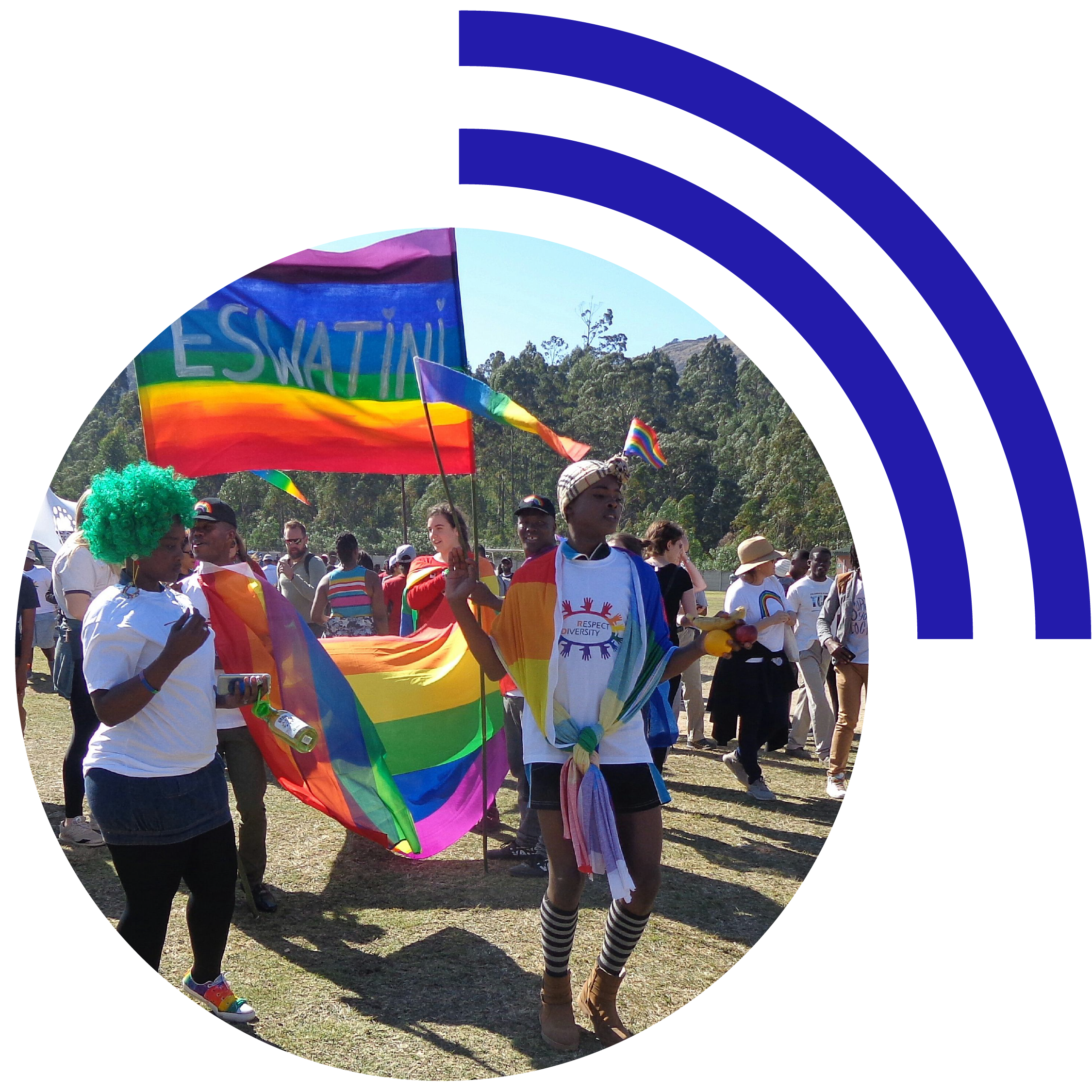
Pride provides a much-needed platform to raise awareness. And awareness serves as the first step towards decriminalization [of same-sex relations].
Bosnia and Herzegovina
Bosnia and Herzegovina held its first Pride in 2019, the last country in the Balkans to do so. (Outright International report on Pride Around the World in 2022.)
3000
BiH's first Pride attracted about 3,000 people.
Facts
- Hate speech, including by public figures and politicians, was on the rise leading up to the first Pride.
- Administrative obstacles, widespread LGBTIQ-phobia and fears of violent backlash had prevented activists from organizing Pride sooner.
- In 2020, during the COVID-19 pandemic, organizers held many smaller events and activities.
- Pride has already led to more visibility for LGBTIQ people and contributed to the creation of a National Action Plan for the Equality of LGBTI People.
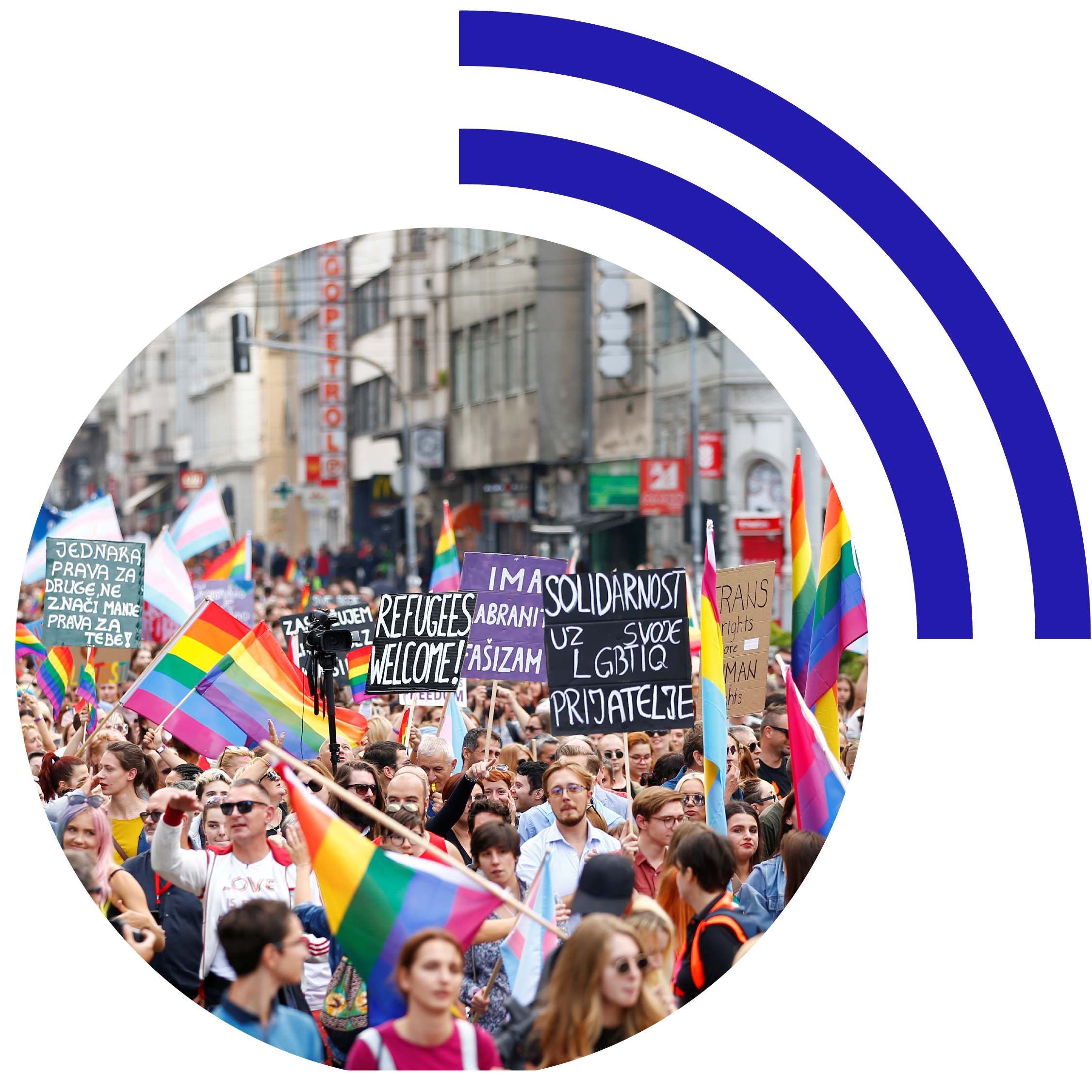
Invisibility, isolation, and violence, in both the private and the public spheres, are the biggest problems for the LGBTIQ population in BiH.
Poland
Pride events, locally known as Equality Marches, have taken place in parts of Poland since 2001. (Outright International report on Pride Around the World in 2022.)
50,000
In 2018, 45,000 people attended Pride in Warsaw, and in 2019, 50,000 attended.
Facts
- LGBTIQ people enjoy few explicit protections under the law in Poland. Despite this, activism by LGBTIQ organizations has grown in prominence and visibility over the last decade, both in relation to Pride events, broader advocacy, campaigns against LGBTIQ-phobia, bullying, and more.
- A growing backlash has accompanied the increasing visibility of the country’s LGBTIQ communities, largely due to growing conservative political influences.
- Hate speech from ruling politicians and the growing opposition to LGBTIQ equality more broadly has created challenges to organizing Pride events, both in obtaining relevant permissions and collaborating with law enforcement, resulting in an increase in public backlash.
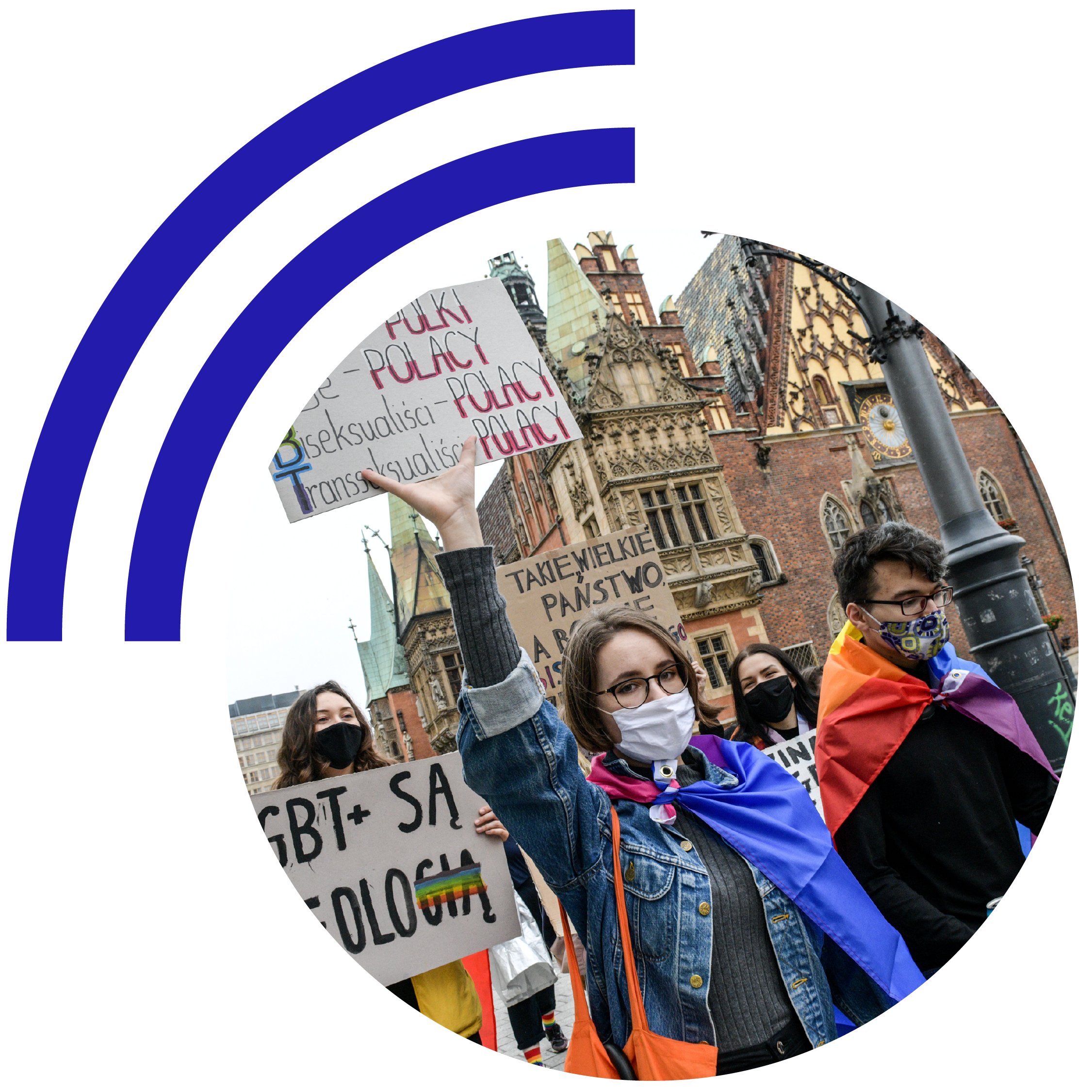
We've been through a very rough time, but at the same time, we're going out in the streets, and saying we are stronger and we're not going to give up.
Türkiye
Despite bans on multiple Pride events and massive police repression and violence directed at Pride, the committee organizing Istanbul Pride says it continues to build solidarity and community among LGBTIQ people.
530
LGBTIQ activists in Türkiye reported that the government banned 10 events and arrested 530 LGBTIQ people and rights defenders within 37 days. [in 2022]
Facts
- Pride began in Istanbul in 2003 and grew in size each year up to 2015.
- From 2015 to 2022, there have been continued bans against Pride marches in multiple cities and systematic attacks by law enforcement against demonstrators, including detentions.
- In years since, marches have been banned. However, Pride did not stop. Each year activists and participants went ahead with Pride marches, defying bans and facing violent police clampdowns.
- The increasing clampdown on civil society and any form of perceived dissent have been accompanied by mounting hate speech, including against LGBTIQ people.
- In 2022, Turkish authorities arrested hundreds of people at Pride events, the largest crackdown to date.
- Freedom of assembly for LGBTIQ people is under attack, while religiously motivated homophobia and transphobia manifested in multiple demonstrations in 2022 calling for bans on so-called LGBTIQ propaganda.
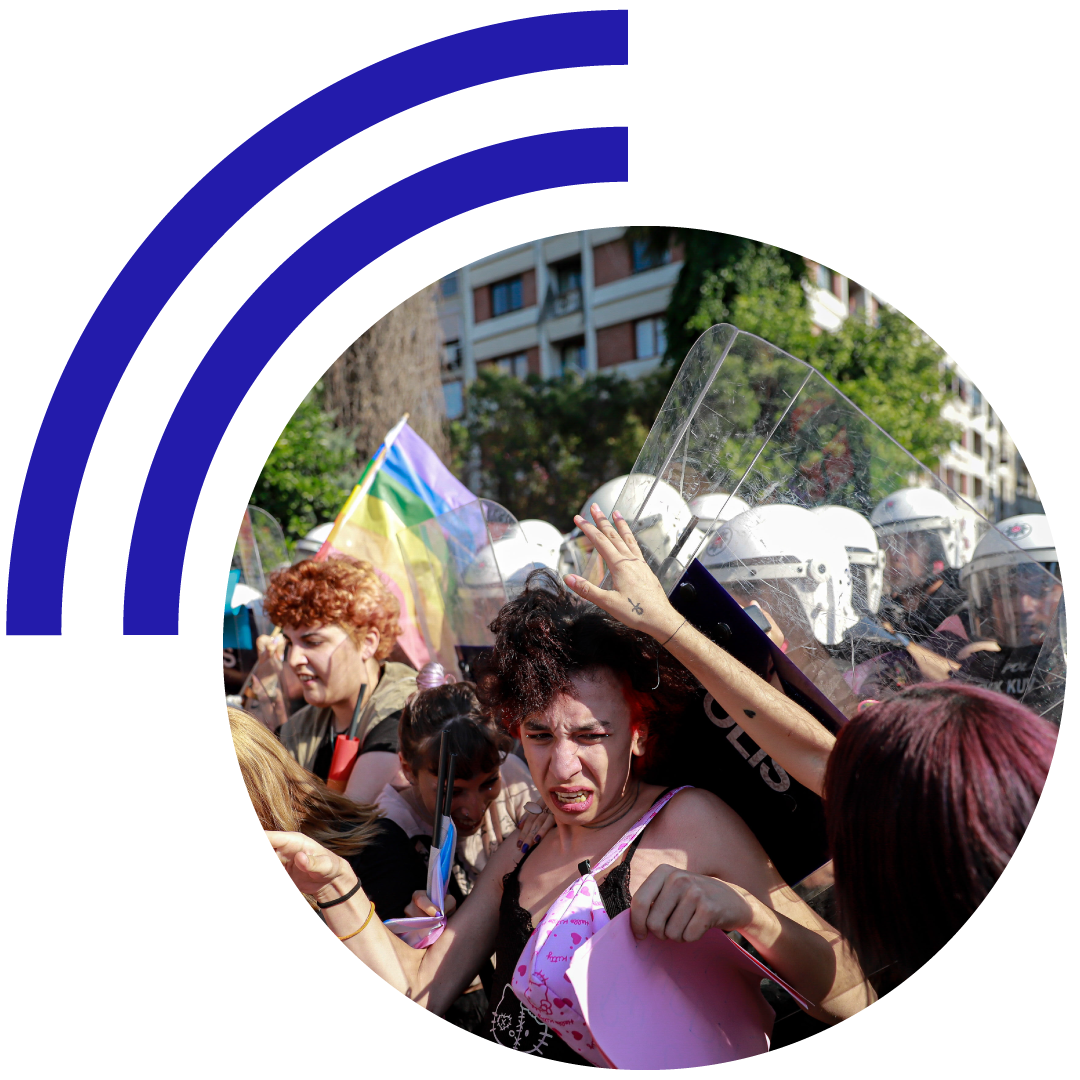
“No matter what, Pride March will happen. And this year we are going to have Trans Pride as well.”
Philippines
Pride events in the Philippines started in the early 1990s. Some progress has been made toward LGBTIQ equality, and Pride has undoubtedly played a role in achieving it. However, the increasing visibility of a growing Pride movement has been accompanied by resistance, too.
20
At Mendiola Pride in 2020, 20 people – who became known as the “Pride 20” – were arrested by police as a part of a government clampdown on dissent.
Facts
- Pride events in the Philippines started in the early 1990s.
- Some progress has been made toward LGBTIQ equality, and Pride has undoubtedly played a role in achieving it.
- However, the increasing visibility of a growing Pride movement has been accompanied by resistance, too.
- Mendiola Pride in 2020 ended with “a vicious mass arrest,” violent dispersal, and the illegal detention of 20 people. Yet the arrests “sparked a national conversation led by the LGBTIQ community not only about discrimination, but about state fascism, police brutality, and tyranny,” according to organizer Rey Valmores-Salinas.
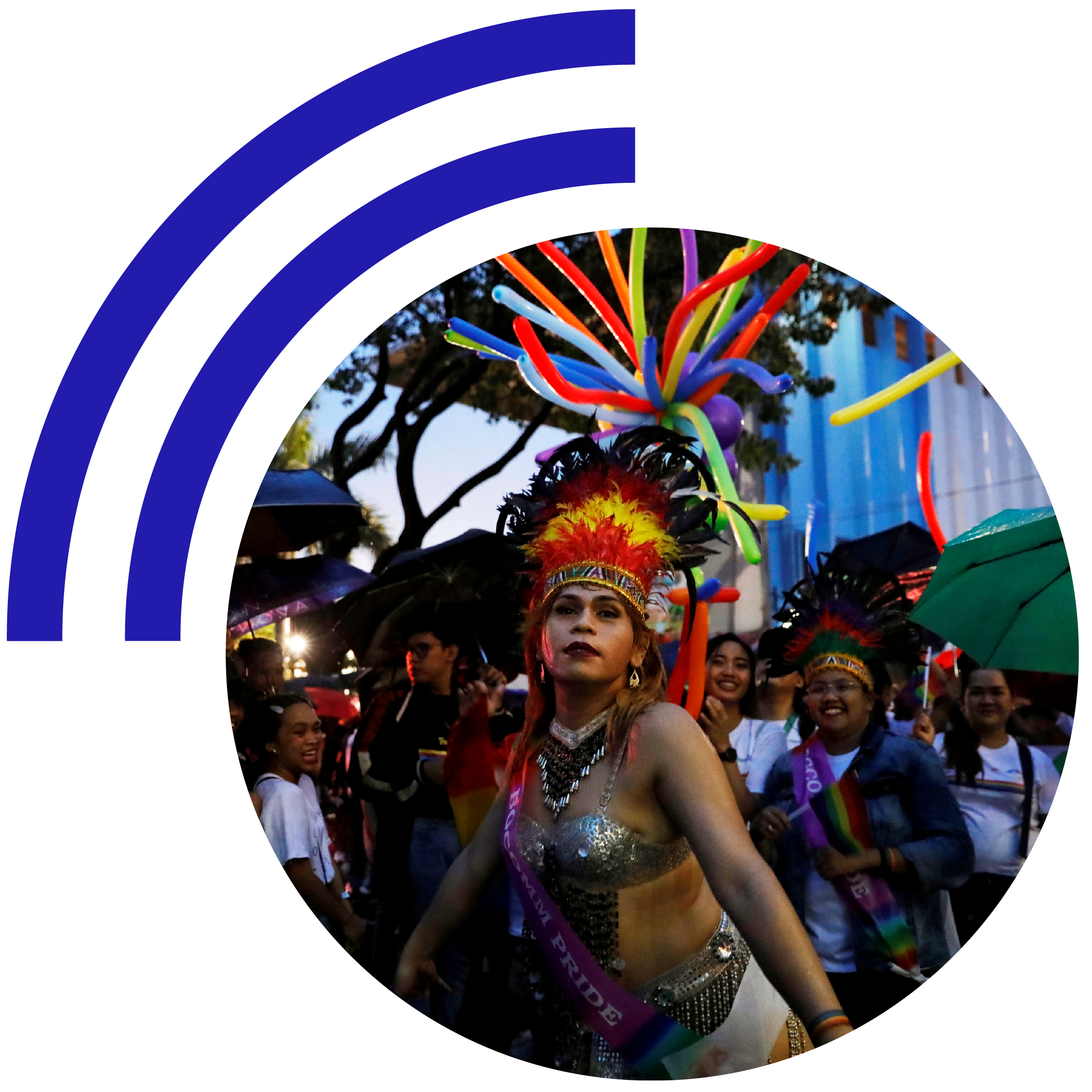
The battle for human rights for LGBTIQ people is undertaken by “standing alongside other oppressed peoples, in a movement from the grassroots."
South Korea
South Korea has a long tradition of holding Pride events, locally known as Queer Culture Festivals. (Outright International report on Pride Around the World in 2021.)
79%
Pew Research shows a generational divide in responses to a survey question on whether “homosexuality should be accepted by society”: in a 2019 poll, 79% of South Koreans aged 18 to 25 said yes, compared to 23% of those older than 50.
Facts
- Queer Culture Festivals in South Korea date back to 2000.
- Today, despite the growing Pride tradition across the country, the Queer Culture Festivals of South Korea are coming under fire. Conservative Christian churches have mobilized to oppose the Queer Culture Festivals, encouraging followers to protest them, resulting in festivals attracting counter-protests that have led to violence.
- In 2022, South Korea celebrated Pride for the first time since the COVID-19 pandemic. The event saw the attendance of anti-LGBTIQ rights and religious fundamentalist protesters holding signs such as “Homosexuality is Sin” and “No!! Same-Sex Marriage.”
-In 2023, the Seoul Metropolitan Government denied the Seoul Queer Culture Festival permission to use the venue customarily used for Pride, granting it instead for a Christian youth concert. Taiwan and Hong Kong Prides have issued a petition in support of Seoul Pride, urging the South Korean government to grant permission to handle the venue application “with due transparency in accordance with democratic principles.”
- Queer Culture Festivals in Korea consist of a Pride march and other activities. Booths usually line a square, and performances and speeches affirming the existence of LGBTIQ people, calling for recognition of rights, and expressing solidarity take place on a stage.
- Activists are using the platform of the Queer Culture Festivals to advocate for an anti-discrimination law that would explicitly protect people from discrimination on grounds of sexual orientation and gender identity.
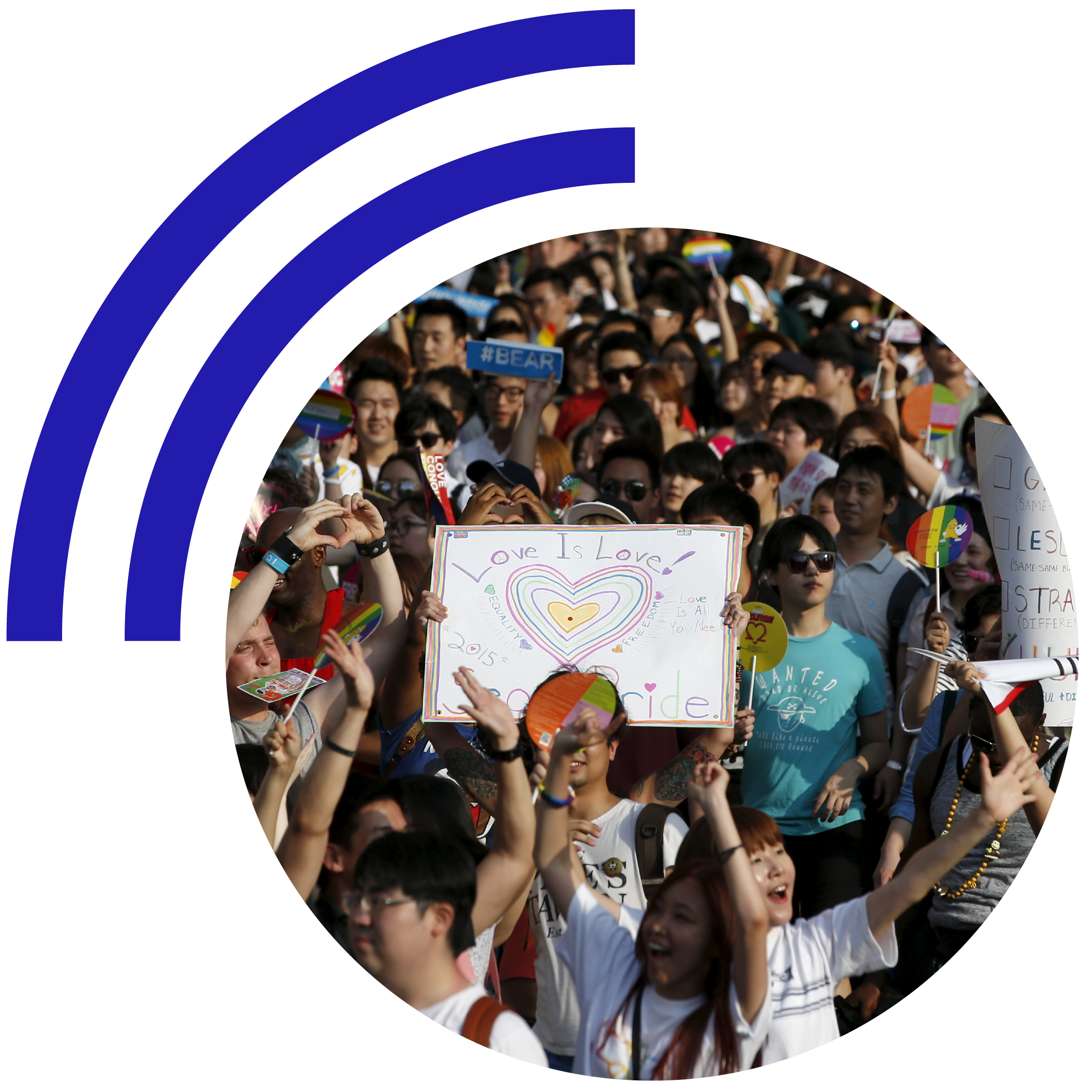
Local conservative churches mobilized thousands of protesters to keep the queer festival from happening.
Uganda
Activists in Uganda organized Pride events from 2012-2015, but threats of arrest and violence have forced them to stop organizing Pride until it is safer to do so. (Outright International report on Pride Around the World in 2021.)
100
Between 2012 and 2015, Pride events drew up to 100 participants.
Facts
- Despite a highly restrictive environment of state repression, activists managed to hold several Pride events in Uganda.
- The Pride events of 2012 to 2015 proceeded without incident, except for some heckling from the public.
- In 2016, the Pride event was shut down by police before it could begin.
- In 2019, organizers tried to revive the event but were threatened with arrest and violence.
- Same-sex relations have been criminalized in Uganda since British colonial times, and hate speech from religious leaders, politicians and the media, is prominent in the country.
- The newly enacted Anti-Homosexuality Act 2023 prohibits organizations from “promoting” or “normalizing” consensual same-sex intimacy, effectively enacting a ban on Pride. The Act also includes the death penalty for some consensual same-sex acts and imposes on everyone in Uganda a duty to report LGBTQ people to the police.
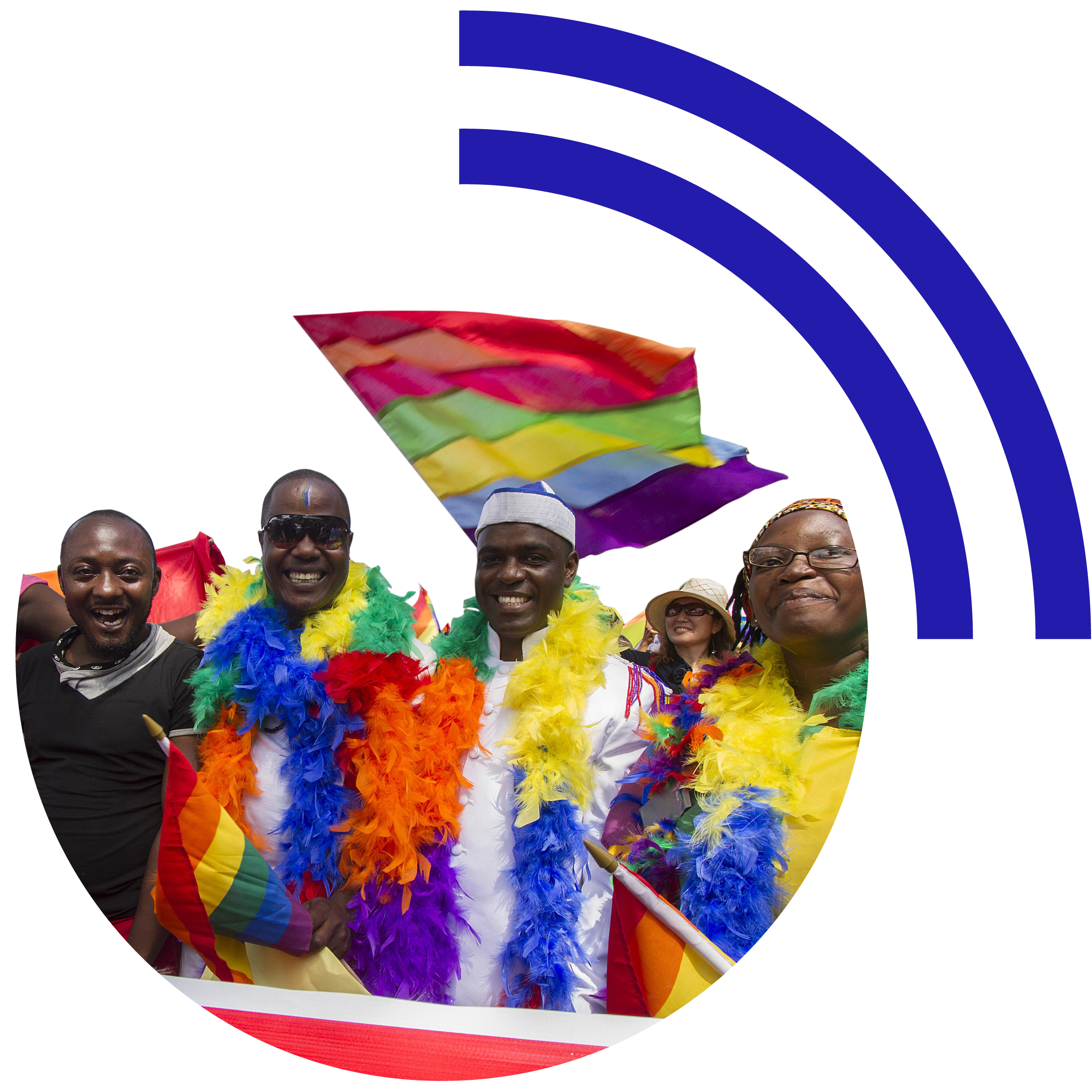
We continue to call for full equality and justice for LGBTIQ people.
Singapore
Activists in Singapore have organized events like Pink Dot SG and IndigNation to show support for the human rights of LGBTIQ people. (Outright International report on Pride Around the World in 2021.)
28,000
While 2,500 people attended the first Pink Dot SG in 2009, as many as 28,000 people attended the event in 2019.
Facts
- Although Singapore only decriminalized same-sex relations between men in 2022, activists have organized Pride-like events such as Pink Dot SG and IndigNation since 2005.
- Pride serves the purpose of building community, affirming existence and creating visibility as well as pushing for change.
- A law that restricts public protests serves as an obstacle to Pride marches.
- At Pink Dot SG, attendees gather to form a "pink dot" to show support for inclusivity, diversity and the freedom to love.
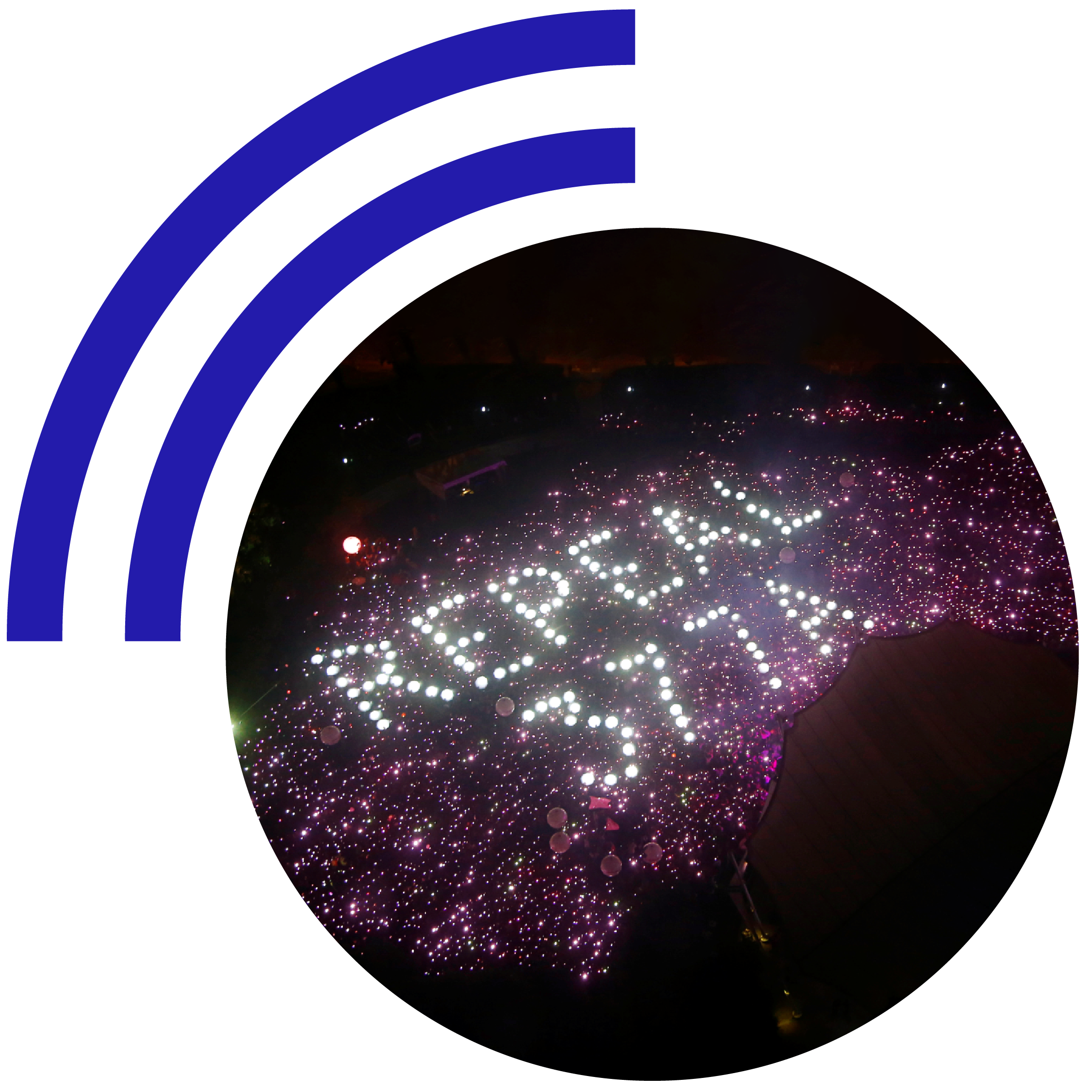
Pink Dot events usually feature concert performances and booths sponsored by organizations supporting the LGBT community and cause.
Trinidad and Tobago
Pride was launched in Trinidad and Tobago in 2018. (Outright International report on Pride Around the World in 2021.)
30 years
LGBTIQ community events in Trinidad and Tobago “date back at least 30 years.”
Facts
- In 2018, the High Court of Justice decriminalized same-sex relations, making Trinidad and Tobago one of the first countries in the region to shed this colonial legacy.
- Some public antipathy remains, but LGBTIQ people enjoy greater visibility and growing levels of acceptance in society, enabling Pride events to be staged in recent years.
- Pride events have proceeded without incident beyond a few social media comments and the arrest of two counter-protestors. Activists have experienced effective collaboration with authorities.
- In future years, organizers aim to have the Pride festival become a staple in the calendar of Trinidad and Tobago’s cultural events.
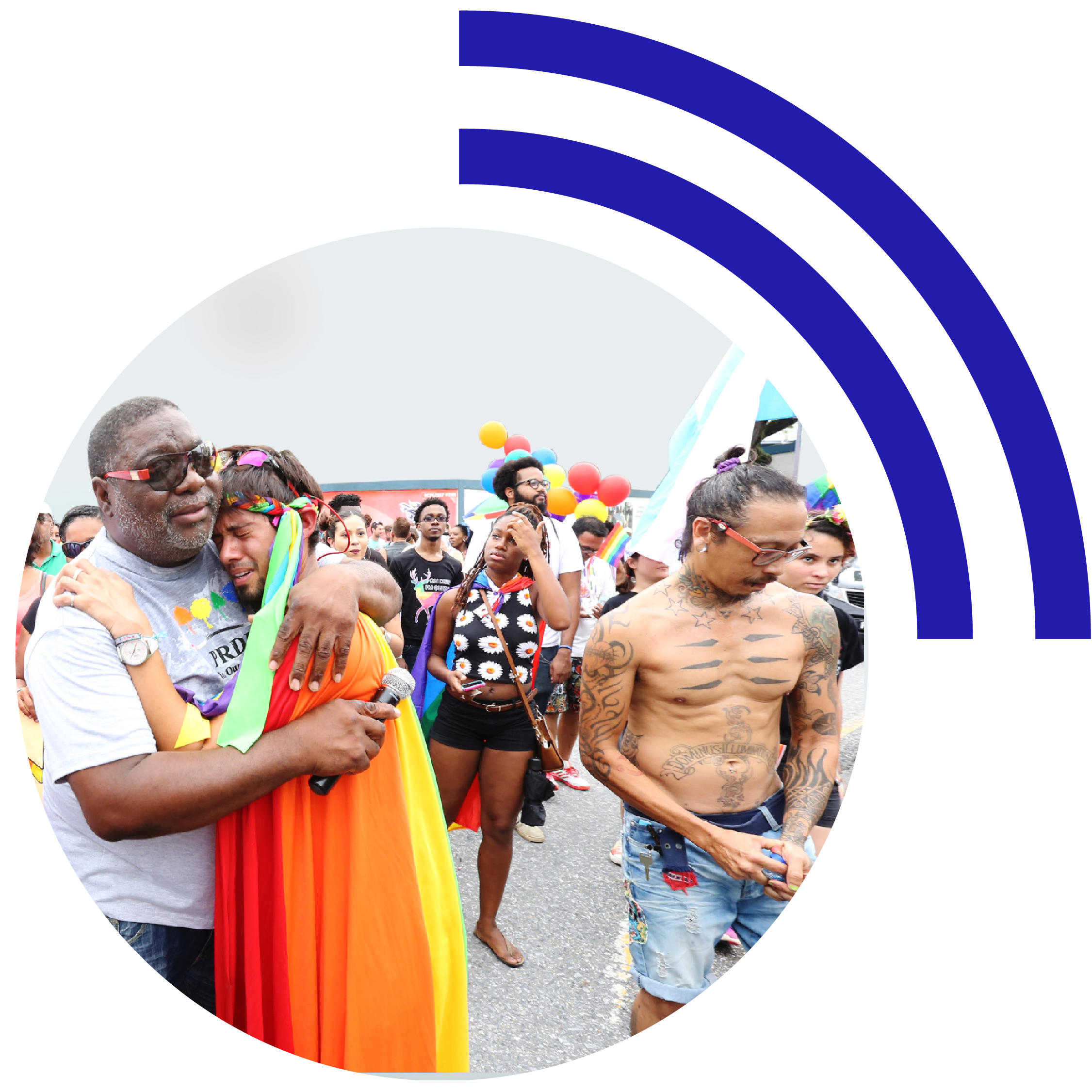
The festival has been a massive success for the community. We engaged over 3,000 persons throughout the events, with our virtual Parade garnering over 500 participants.
Sri Lanka
Despite criminalization of same-sex relations in Sri Lanka, activists in Sri Lanka held their first Pride marches in the streets of Colombo and Jaffna in 2022. These events followed the development of a Pride movement dating back to 2005, with events becoming increasingly public over the years. (Outright International report on Pride Around the World in 2021.)
500,000
According to activist Rosanna Flamer-Caldera, virtual Pride events during Covid reached half a million.
Facts
- With every subsequent year, activists have gone further. Now, Pride includes street marches along with a queer film festival, a rainbow kite festival on the beach, theatrical performances and workshops for journalists, as well as family and friends of LGBTIQ people and more.
- The 2022 Pride march in Colombo was closely linked to a protest movement calling for then-President Gotabaya Rajapaksa to resign.
- In the wake of a ruling from the Committee on the Elimination of All Forms of Discrimination Against Women finding Sri Lanka’s anti-homosexuality laws are an illegal form of discrimination against women, Sri Lankan parliamentarians introduced a bill to decriminalize same-sex intimacy that is currently pending.
- Despite little political will to recognize the rights of LGBTIQ people and police targeting of the community, societal views are becoming more progressive.

We had a drag show as the cabaret for the party! It was so much fun. So much so that the next year we felt we could go a bit further.
2018
Pride events became possible in North Macedonia in 2018 after the defeat of the conservative Christian nationalist party that had ruled the country for 11 years.
Facts
- Pride was first possible due to the defeat of a party that had opposed equal rights for LGBTIQ people and used homophobia as a tool to distract from its political and economic failures.
- Newly elected politicians have been more supportive of LGBTIQ events and have allowed Pride to take place.
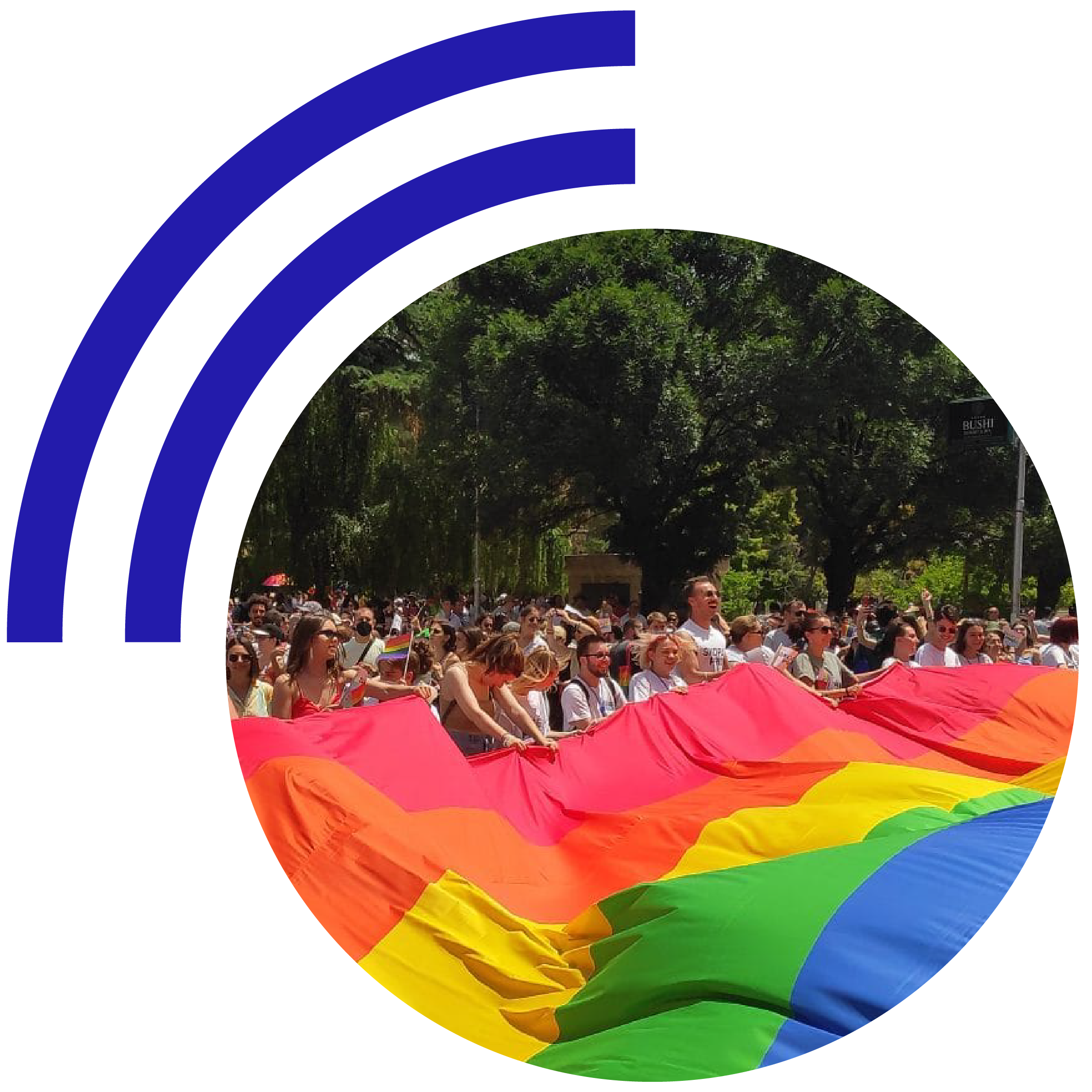
A very difficult period has passed for the LGBT community and we consider that now is the moment for a Pride Parade.
Botswana
Botswana held its first Pride in 2019 after decriminalizing same-sex sexual relations earlier in the year.
Botswana's former President, Festus Mogae spoke at Pride Afrique in 2020.
Dania Abraham | Saint Lucia
Hear from Dania Abraham from the organization United and Strong. A human rights NGO representing marginalized groups on the Caribbean island of Saint Lucia. United and Strong Inc was formed in 2001 and became a registered Non-Governmental Organisation (NGO) in 2005.
Saint Lucia’s Penal Code criminalizes “buggery” and “serious indecencies.” Though these laws are rarely enforced, they contribute to the pervasive antipathy towards LGBTIQ people in Saint Lucia. LGBTIQ people experience discrimination in employment, housing, healthcare, and education, despite the existence of a law protecting citizens from employment discrimination. Saint Lucia’s buggery laws are currently being challenged at the High Court of Justice.
Global Pride
Global Pride aimed to serve as a space for “the LGBTI+ community around the world to come together and celebrate diversity and equality during these challenging times.”
57 million
Organizers estimate that more than 57 million viewers from all around the world tuned in at some point during the 24-hour online event.
Facts
- The primary organizers, the European Pride Organizers Association and InterPride, wanted to create this space because the COVID-19 pandemic “had a devastating impact on Pride organizations worldwide with hundreds of marches and events canceled or postponed.”
- The event also focused on the pivotal role of Black trans people in the Pride movement and called for an end to racism.
- Speakers included Carlos Alvarado Quesada, the President of Costa Rica, where equal marriage was recently legalized; Erna Solberg, the prime minister of Norway; Xavier Bettel, the Prime Minister of Luxembourg; and First Minister of Scotland Nicola Sturgeon.

What makes Global Pride very unique is that this is the first Pride of its kind where we are really focused on bringing the entire LGBT global community together.
Pride Afrique
Pride Afrique was aimed at LGBTIQ people and allies all across Africa, a continent in which over half the countries still criminalize same-sex relations.

2020
Pride Afrique was held virtually in August 2020.
Facts
- Pride Afrique was an online pan-African celebration of Pride.
- The broadcast was spread across three days, with noncontinuous events going out at different times.
- According to participating organization The Centre for Human Rights at the University of Pretoria in South Africa, it “explor[ed] the diversity of the LGBTIQ+ lived experiences of queer persons in Africa and the diaspora … Pride Afrique 2020 incorporated multiple levels of storytelling that were structural, relational and personal while creating a multi-dimensional narrative for the LGBTIQ+ community.”
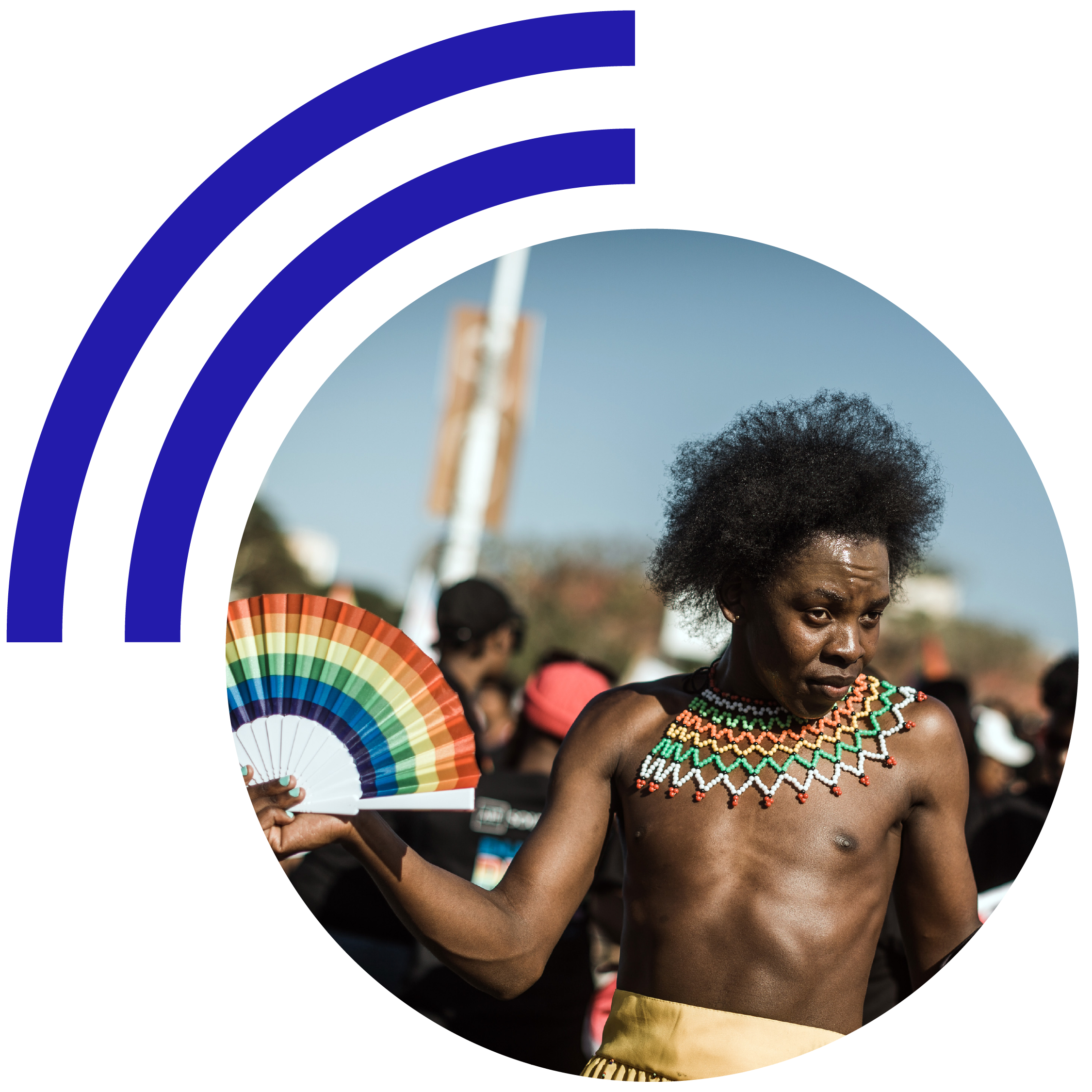
We're doing this because right now in Africa, many countries are criminalizing LGBTIQ people & we want to send a message to them that they are not alone & that there is a community where they belong.
Pride of Africa, Johannesburg
Pride of Africa, Johannesburg, had to go virtual in 2020 during its 30th anniversary year. Going virtual in 2020 helped bring those people to an African Pride event that could have been held in only a few other African countries.

2020
Pride of Africa, Johannesburg, had to go virtual in 2020 during its 30th anniversary year.
Facts
- Johannesburg, South Africa, was the site of the first Pride march on the African continent in 1990.
- Recently rebranded as Pride of Africa, Johannesburg Pride also spread in the form of African Pride Month, using the whole month of October to stage virtual events and reach out to LGBTIQ people all over the region and the continent.
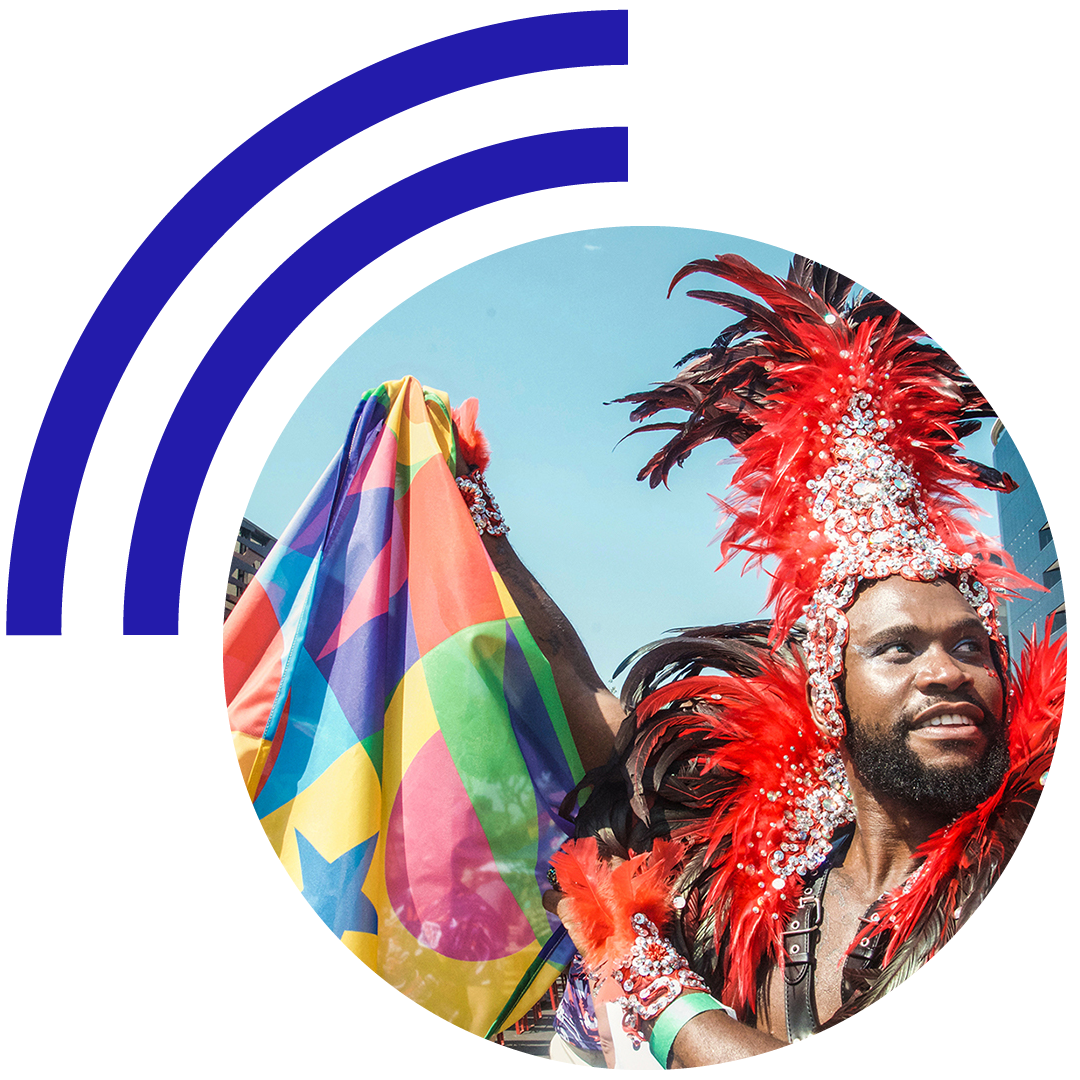
We took a look at the flags of 54 African countries and the rainbow colors were added. The new shapes and forms were used to build the unique brand identity: Pride of Africa.
Global Black Pride
Global Black Pride gave space to Black LGBTIQ people from around the world to come together and celebrate their intersecting identities.
4
A mix of prerecorded content and live broadcast, the first Global Black Pride connected organizations and viewers on 4 continents.
Facts
- Global Black Pride was set up not only in response to the COVID-19 pandemic, but also due to the global spotlight on racism and police brutality in the aftermath of the murder of George Floyd in the U.S. and the wave of Black Lives Matter protests which swept across cities around the world.
- It was first held virtually on July 10, 2020, just after Pride Month, and again in 2021.
- An in-person Global Black Pride was held in Toronto in 2022.
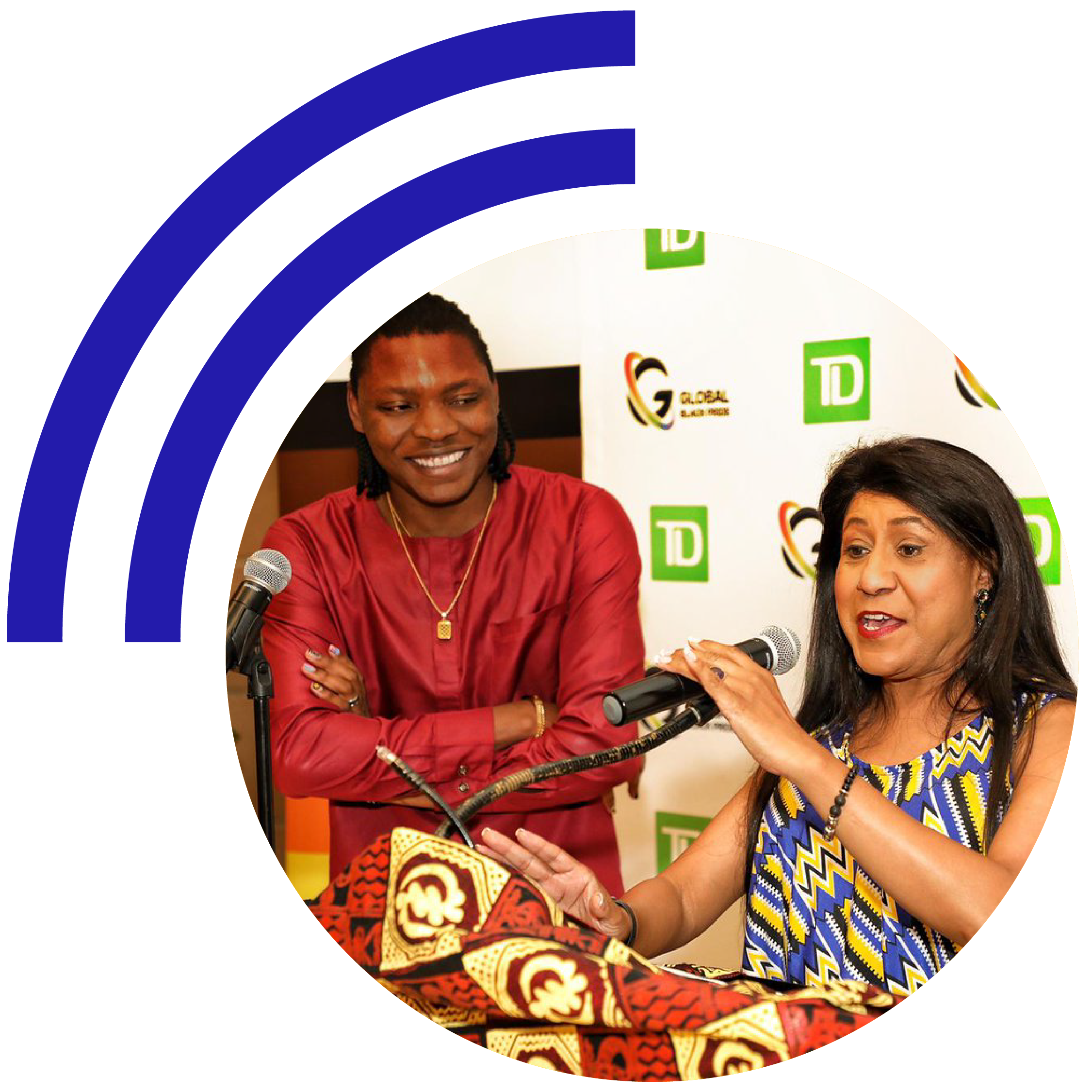
We wanted to create a space for Black Pride and for people across the globe to connect.
The Bahamas
After a hiatus, the Bahamas began hosting Pride again in 2020 to raise awareness and visibility for the LGBTIQ community.
400,000
In 2020, about 800 people registered to attend Pride online, a remarkable turnout in a nation of 400,000 people.
Facts
- Several small Pride events have been hosted in the Bahamas since 2001, but backlash against a larger Pride event in 2014 caused it to be canceled.
- In 2020, activists decided to organize Pride again. It was hosted online due to the COVID-19 pandemic, and about 800 people registered to attend.
- The Bahamas Christian Council has pushed back against Pride and LGBTIQ visibility in general.
- Organizers have said that Pride in the Bahamas is intended to educate people and raise visibility.
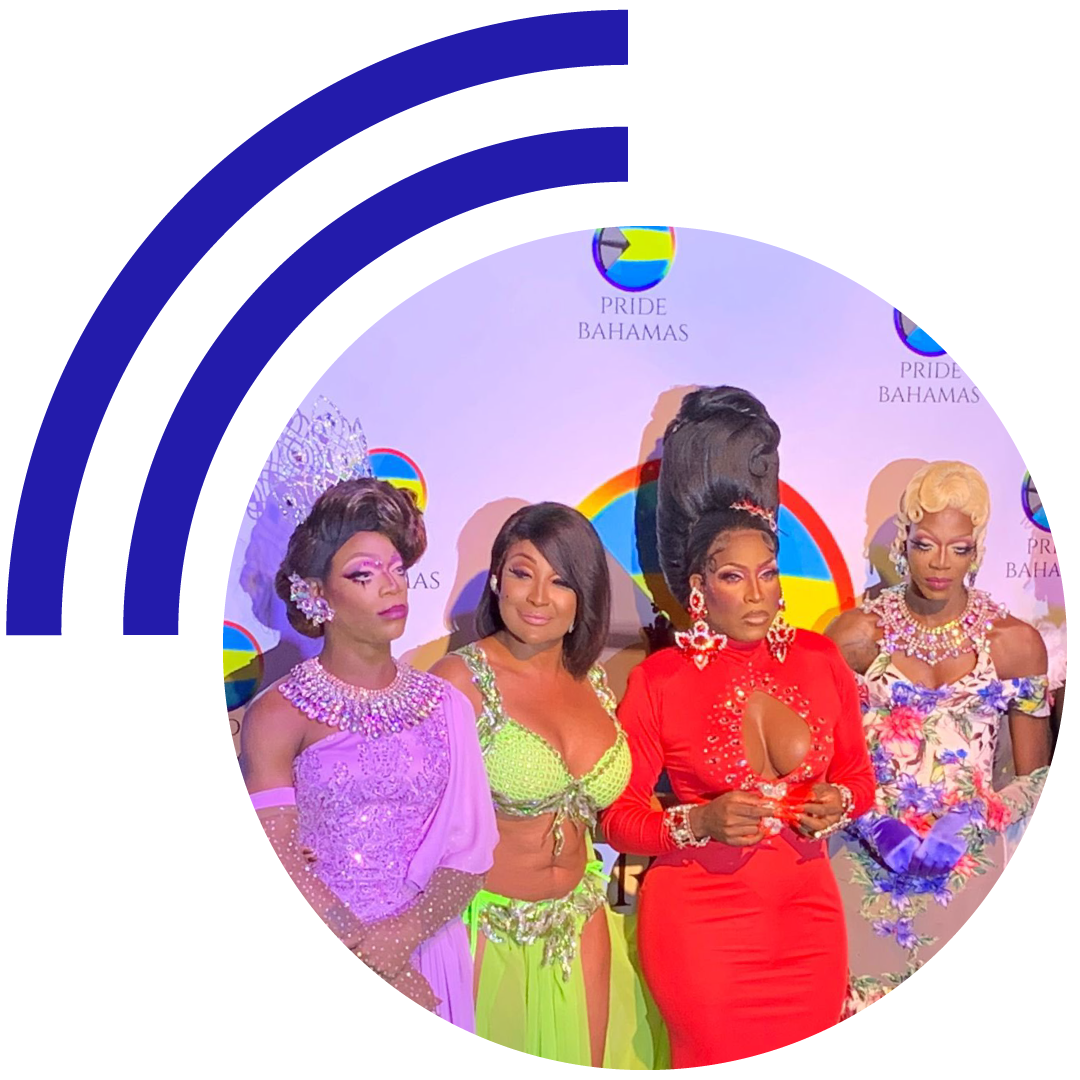
Pride in the Bahamas is about education. As Nelson Mandela said, the most powerful weapon is education.
Georgia
Georgia hosted its first public demonstration in support of LGBTIQ human rights in 2012 to mark what is now known as the International Day Against Homophobia, Biphobia, Interphobia, and Transphobia.
47%
One survey suggested that 47 percent of Georgians believe that the rights of LGBTIQ people should be protected.
Facts
- Far-right groups have threatened, harassed, and violently attacked Pride participants.
- Because of the strong and traumatizing backlash to Pride and the personal risks involved, many LGBTIQ activists have switched tactics and are focusing on year-round community empowerment rather than certain days of visibility.
- Some activists are calling for more intersectional approaches to LGBTIQ advocacy.
- In resistance to the violence of far-right groups, some activists are still fighting for the visibility of LGBTIQ people through public demonstrations.
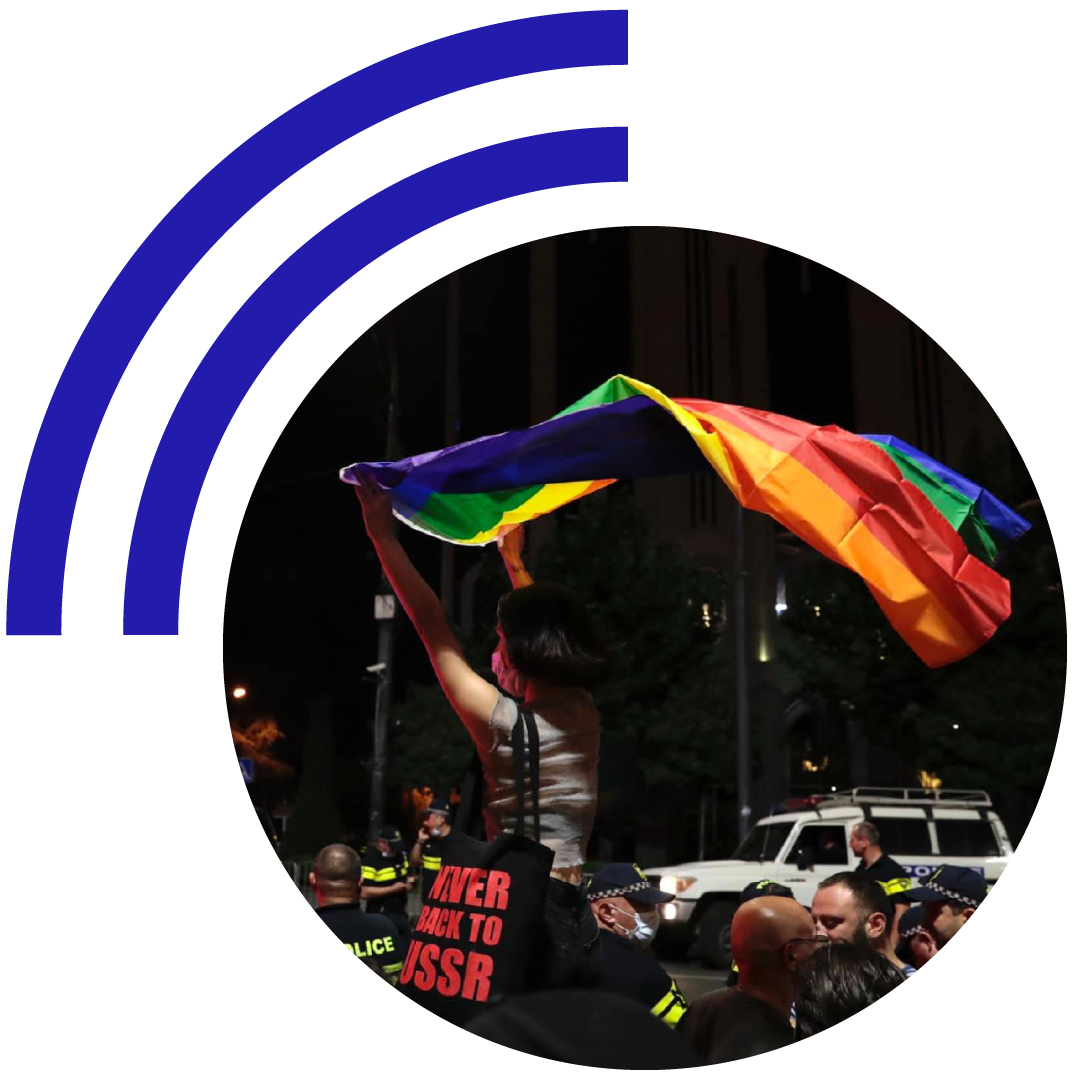
We were hunted. They were trying to destroy us.
Ghana
Even in countries like Ghana, where the laws are repressive against gender and sexual diversity, LGBTIQ persons take steps to recognize the progress made, foster community, and build acceptance.
2021
In 2021, Parliament introduced an expansive anti-LGBTIQ law which is still under consideration but has contributed to widespread human rights violations against LGBTIQ persons.
Facts
- Over the years, Ghana's atmosphere has become increasingly hostile against persons of non-conforming sexual orientations and gender identities or expressions.
- In light of this, LGBTIQ organizations in Ghana cannot organize public Pride events as they would prefer.
- Challenges to such events include the widespread stigma against sexual and gender diversity, discrimination and security issues.
- In previous years, various organizations would hold discreet Pride month activities during June. However, they always prioritized safety and security for LGBTIQ persons.
- Activists also have found ways of incorporating celebration of LGBTIQ people’s rights and identities into local festivals.
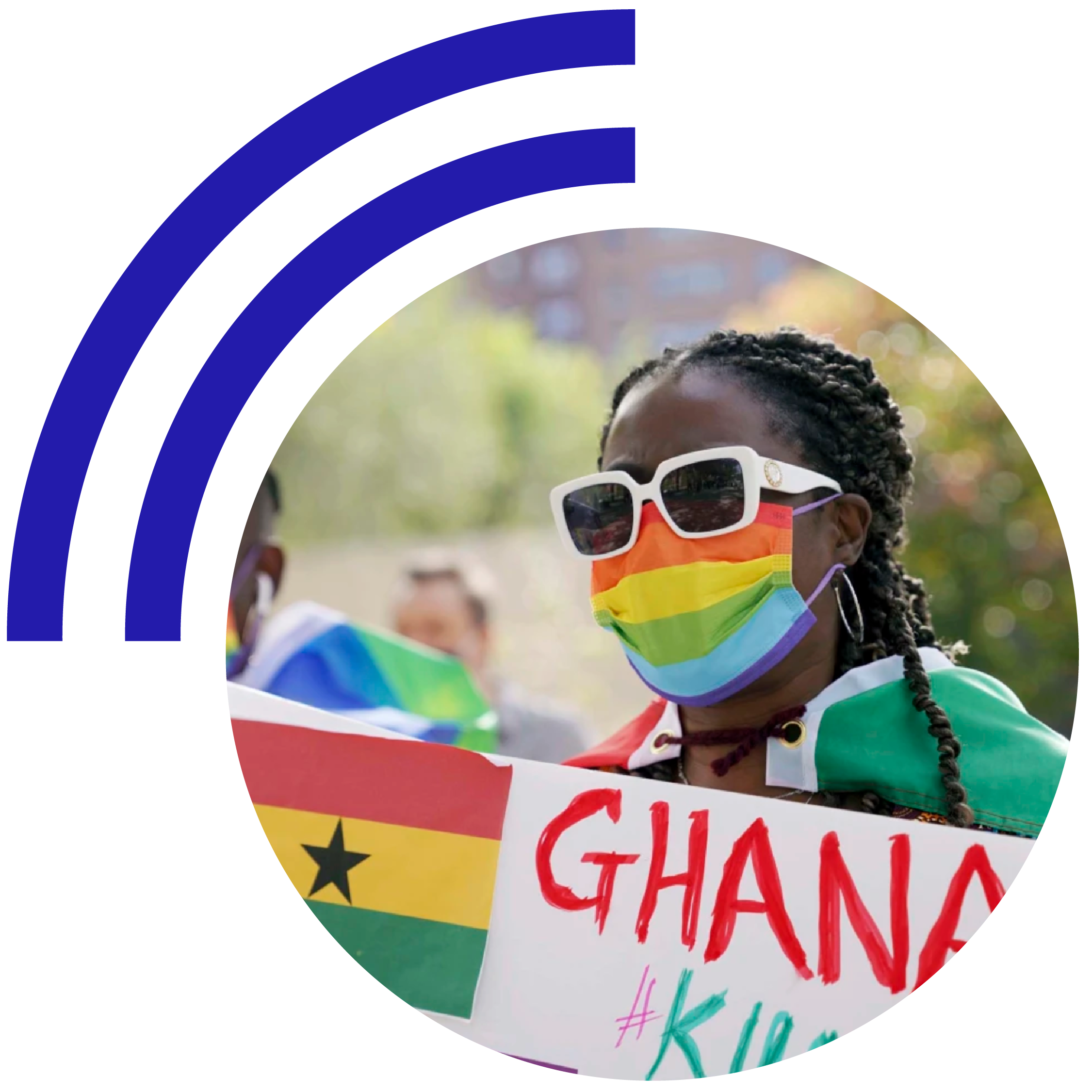
We’ve not done the open and public ones because of the security issues and the risks it will bring.
Hungary
Pride in Hungary, where LGBTIQ people’s human rights are heavily contested, has always had a political edge.
1997
The first Budapest Pride that included a public march was celebrated in July 1997.
Facts
- The first Budapest Pride that included a public march was celebrated in July 1997.
- For the subsequent 10 years, the event, eventually called the Budapest Pride Film and Cultural Festival, became the largest LGBTIQ-related annual celebration and protest in the country.
- For many years, there were no large groups of counter-protestors. That changed in 2007.
- Several hundred counter-protesters chanted obscenities and threw eggs, bottles and Molotov cocktails at the approximately 2,000 marchers along the parade route. Although police forces were present, they exhibited discriminatory behavior toward the marchers and failed to protect them both during the parade and at a Pride after-party later that evening.
- More than a dozen Pride marchers and party attendees were reportedly injured.
- The climate in Hungary since Viktor Orbán reassumed leadership in 2010 has grown increasingly hostile for LGBTIQ people.
- In June 2021, Hungary passed a law that bans the “display and promotion of homosexuality” among children under 18.
- Hungarian activists have responded by scaling up. Budapest Pride sponsored 82 events in 2021 and mobilized LGBTIQ people and thousands of allies for Budapest’s largest Pride march ever.
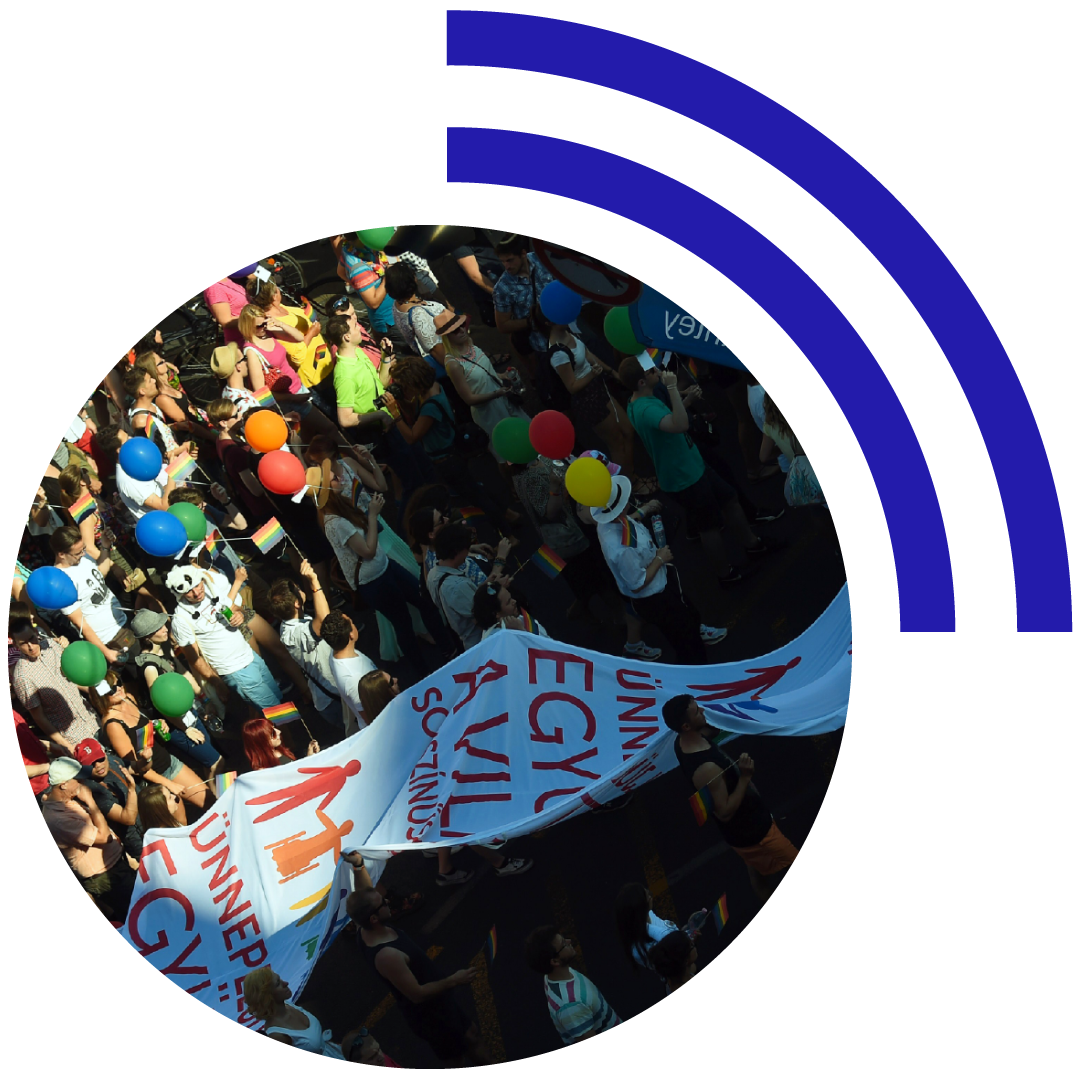
I think what has been special about Budapest pride is that we’ve always been on the more political side.
Lithuania
For many, Pride is more of a protest than a celebration in Lithuania, as many legal reforms are needed to achieve true equality for LGBTIQ people throughout the country.
2021
In 2021, for the first time, activists held a Pride march in a second city, Kaunas, demonstrating that LGBTIQ activism extended beyond the capital.
Facts
- Baltic Pride, conceived as a regional event, seeks to increase LGBTQ visibility, dismantle the arguments against allowing LGBTQ people to exercise equal rights, and demonstrate how progress is being made over time.
- The first Baltic Pride took place in Riga, Latvia, in 2009, thus initiating a regular rotation of Pride hosting among each of the three Baltic state capitals.
- Pride in Lithuania initially faced opposition. About 500 people marched in Vilnius, while 600 police surrounded the marchers, sometimes using tear gas to protect against more than 1,000 anti-gay protesters.
- Some perceived Baltic Pride as elitist because local community involvement is limited in organizing the regional event and because it is always held in a capital city. This critique fueled the organizing of more grassroots Pride celebrations in recent years.
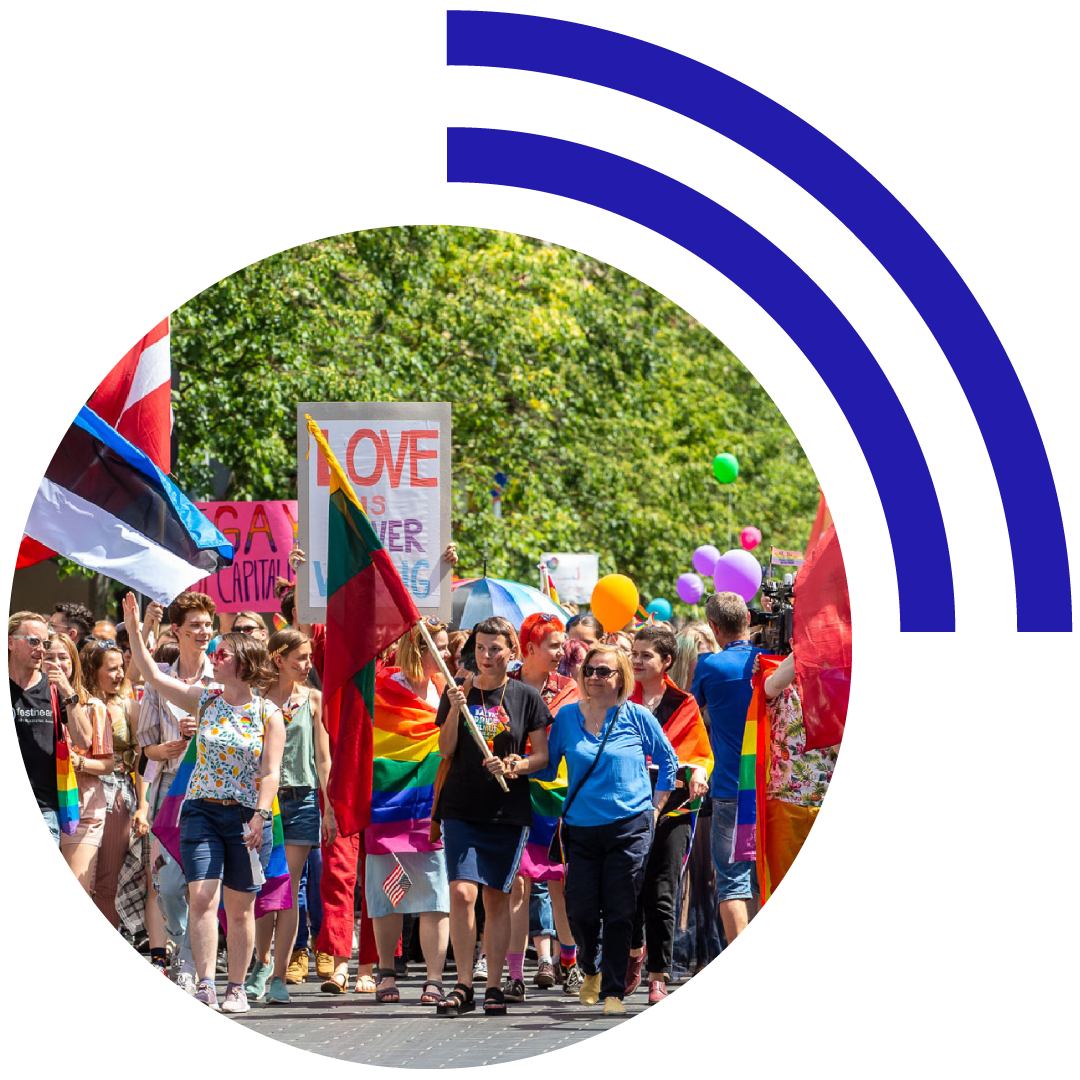
We know how to suffer, but also how to take care of each other.
Malawi
Malawian activists organized the first public Pride march in 2021 to address criminalization and anti-LGBTIQ violence.
50
About 50 people participated in Malawi's first public Pride march.
Facts
- Malawian activists organized the country's first public Pride march in 2021.
- Pride was hosted to increase visibility, address anti-LGBTIQ violence and make demands to the government. These demands included decriminalizing consensual same-sex relations and investigating police violence against sexual and gender minorities and sex workers.
- Some activists had anticipated violence and arrests in response to the 2021 Pride march, but these did not occur.
- However, there was backlash to the 2021 Pride march, as participants have reportedly been threatened, dismissed from school and work, and physically attacked.
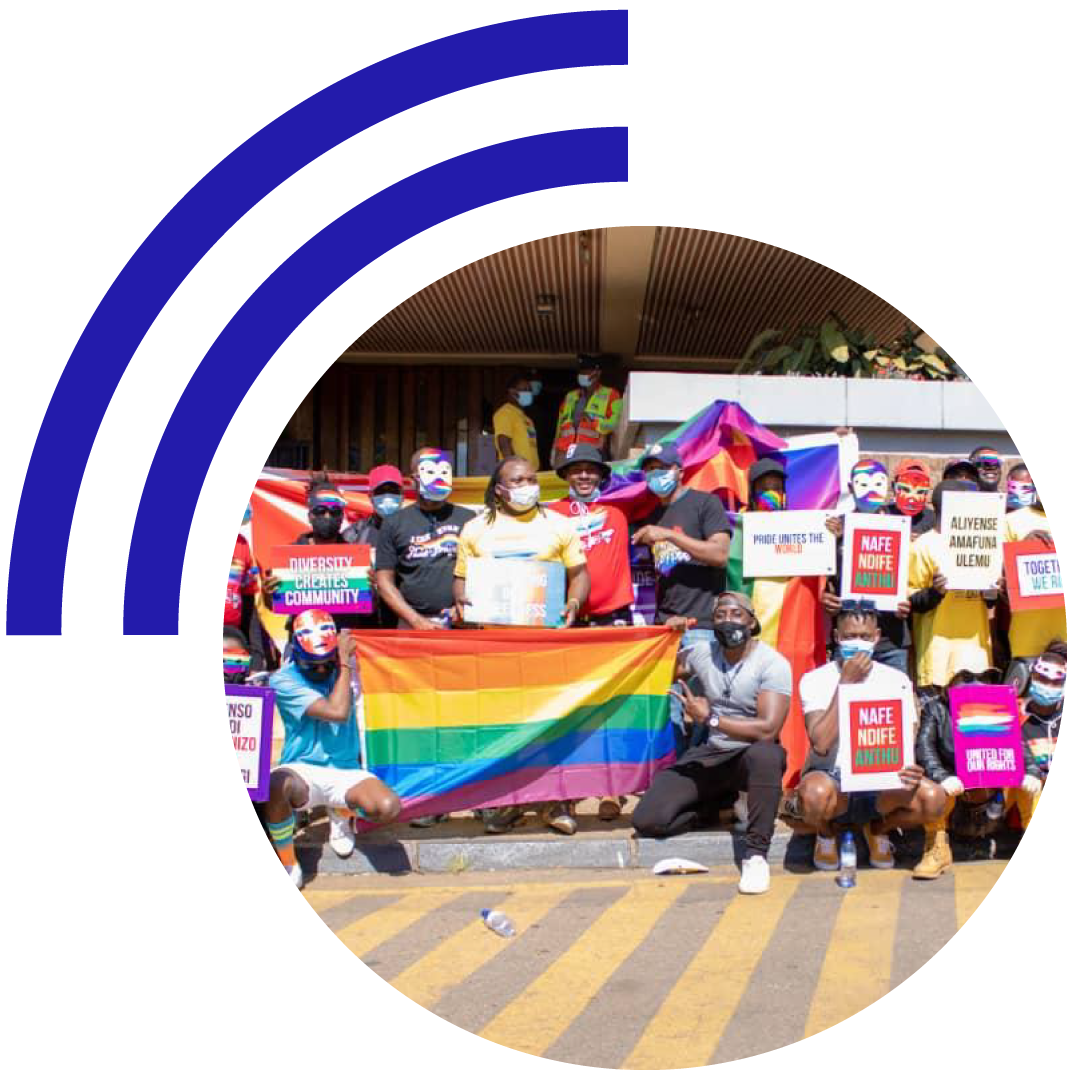
This narrative that there are no LGBTIQ+ persons in Malawi is still continuing – so this was a moment to show everyone that we are here, we exist, and we are not going anywhere.
Rwanda
Rwandan activists organized the first Pride event in 2021 to increase LGBTIQ visibility.
250-300
Rwanda’s first Pride celebration hosted about 250 to 300 people.
Facts
- Although Rwanda does not criminalize same-sex sexual relations, LGBTIQ organizations report that discrimination, particularly in employment, is common and that the fear of discrimination in accessing employment, health care, education and housing prevents LGBTIQ people from living openly.
- Few activists are publicly “out” as LGBTIQ in Rwanda.
- Rwanda's first Pride in 2021 was publicly pitched as an “inclusion event.” In Rwanda, strident political demands or dissent can have severe consequences.
- Pride was held to promote the visibility and inclusion of LGBTIQ Rwandans.
- Activists have been cautious about holding public events related to LGBTIQ issues because of homophobic sentiments in the country.
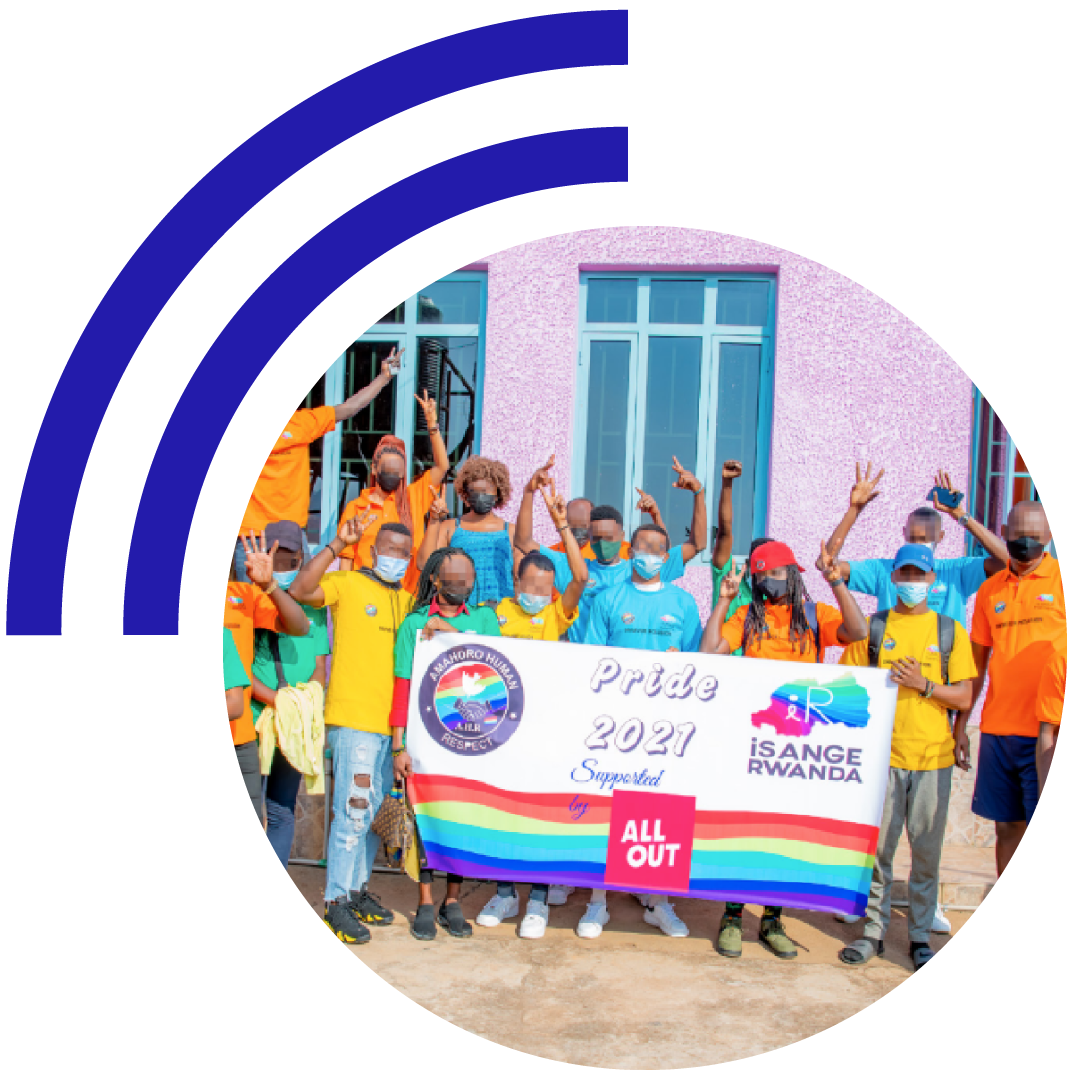
Pride was to raise awareness, to show that LGBTI exists in Rwanda.
Peru
Within two decades of the first Pride March in Peru, there has been a multiplication of marches throughout the country. A map elaborated by the Lima Pride March Collective in 2022 shows that 26 cities organized Pride marches in 2022, with Abancay and Cajamarca having their first Pride marches.
15,000
Official estimates indicate that the Lima March of 2022 had ten times more participation than its inaugural march in 2002, with 15,000 people mobilized.
Facts
- Pride celebrations in Lima took place behind closed doors until 1995.
- Approximately 15 activists attended the first public demonstration in 1995.
- In 2002, a public Pride March was organized for the first time in Peru.
-The lack of legal advances is partly explained by the political situation, where the main political parties in parliament – both left and right – are deeply conservative.
- The Congress of the Republic has been unable to pass an equal marriage law that was presented five years ago, and the Constitutional Court has issued three rulings refusing to recognize same-sex marriages of Peruvians legally married abroad.
- In the case of Azul Rojas Marín v. Peru, the Inter-American Court found Peru responsible for torture and sexual violence against an LGBTI person by Peruvian police officers in 2008. In Olivera Fuente v. Peru, the Peruvian State was found liable for discrimination against a same-sex couple in a commercial establishment in 2004.
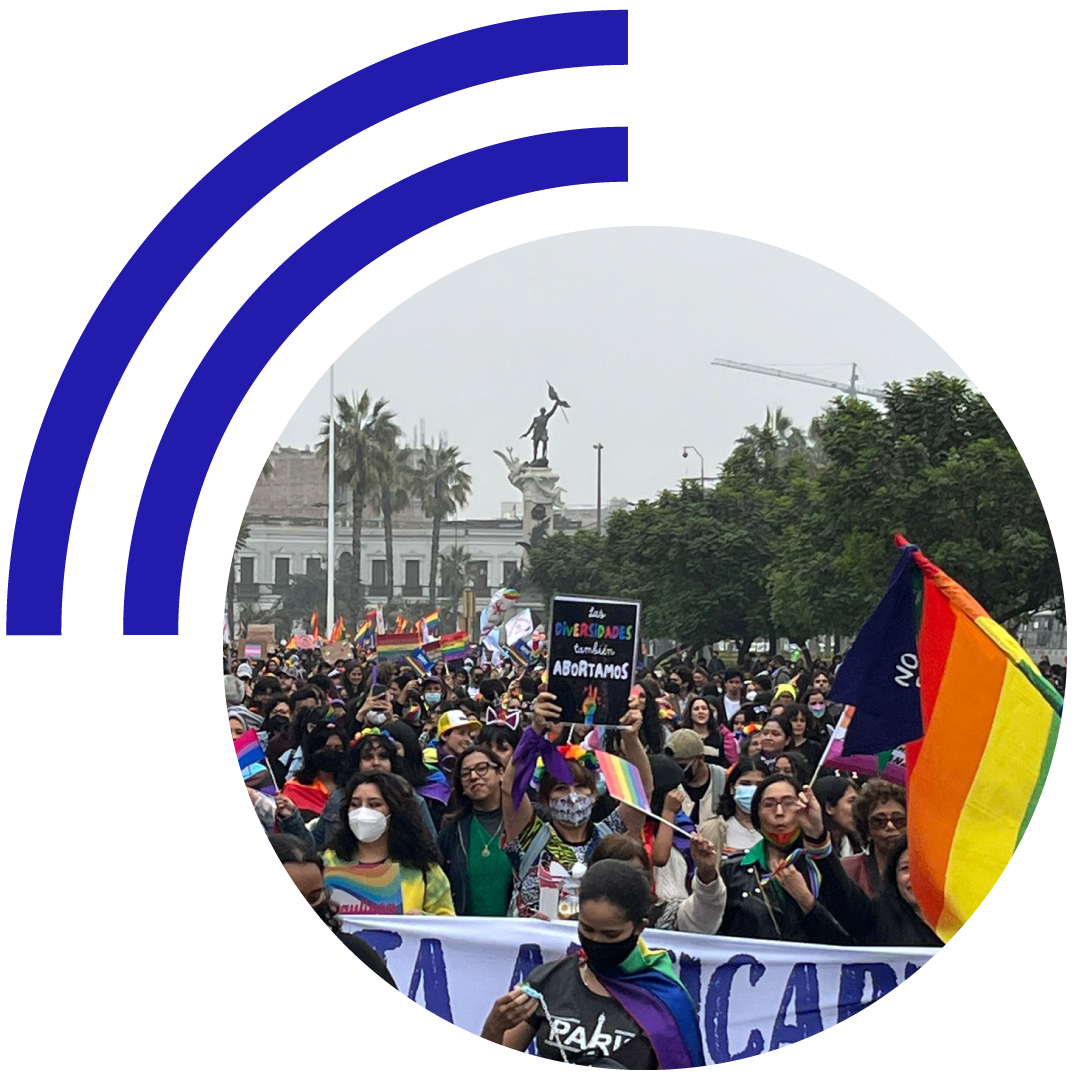
I will always take with me that image of when we passed by a school and the whole student body was glued to the window just to see us. It felt so nice because we didn’t feel alone.
Namibia
There is no shortage of political demands by LGBTIQ Namibians, which are articulated through Pride and other LGBTIQ visibility events. Perhaps foremost on the list is the quest for decriminalizing sodomy in the country.
2019-2021
The latest Afrobarometer survey (2019-2021), ranked Namibia as the “third-most-tolerant of homosexuality” in Africa, behind Cabo Verde and South Africa.
Facts
- In Namibia, the common law inherited through British colonialism criminalizes same-sex sexual acts between consenting adults, although there are rarely, if ever, prosecutions under this law.
- In an early step backward, in 2007, Namibia’s parliament amended the Labour Act of 1992 to remove protections on grounds of sexual orientation.
- In a May 2023 victory, the Supreme Court of Namibia decided that marriages between same-sex couples conducted abroad should be recognized within the country.
- Activists first publicly celebrated Pride in Namibia in 2013 in the country’s capital, Windhoek.
- Pride in 2021 saw the largest physical gathering, with about 500 LGBTIQ people, activists, and allies participating in a march.
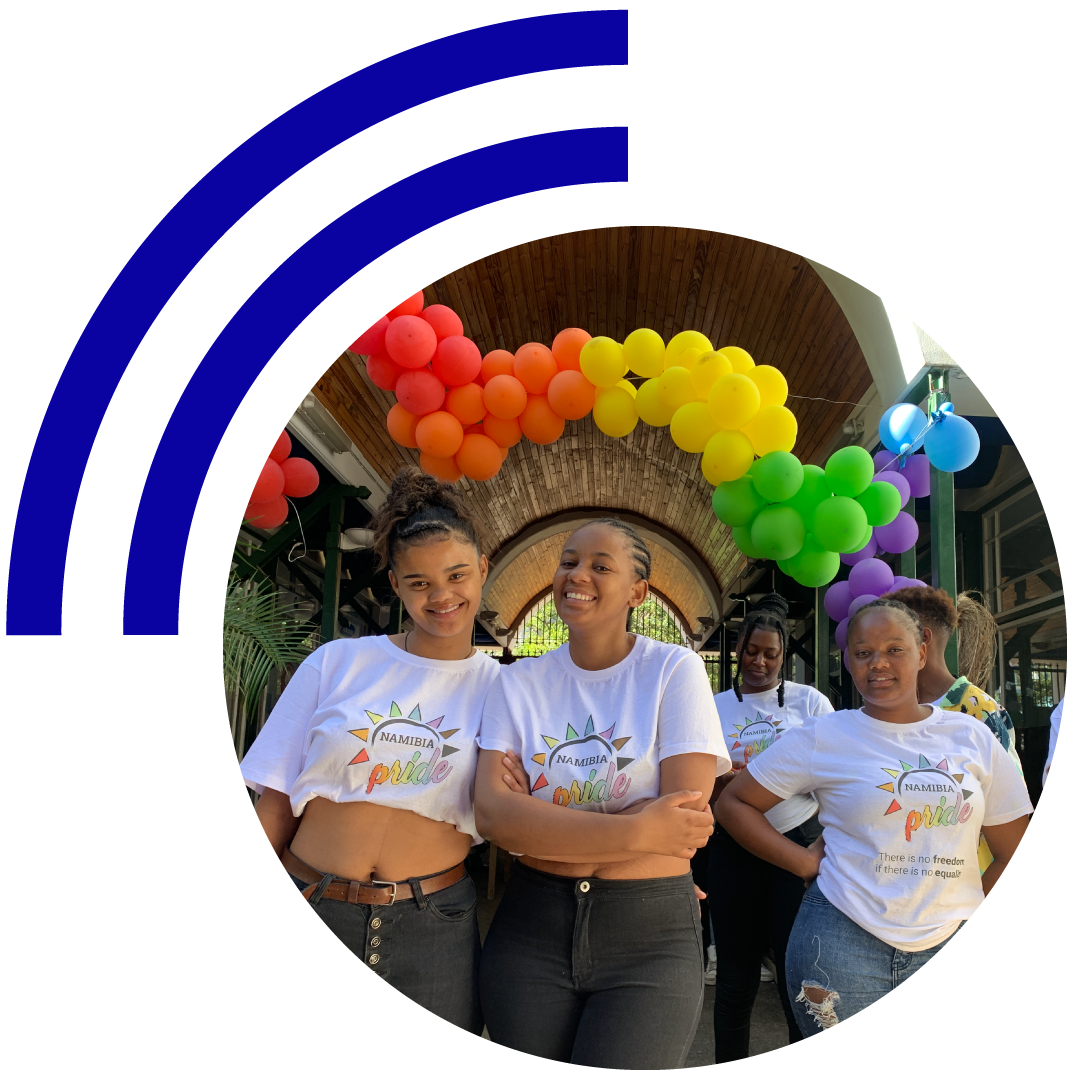
If I saw Pride parades happening when I was in school and younger, it would have done so much for me. It would have given me so much more validation and changed the trajectory of my young adult life.
Friedel Dausab | Namibia
Friedel Dausab, the Safety and Security Officer at Positive Vibes Trust, said his country was still embracing colonial-era laws that were victimizing the LGBTIQ community. Watch and learn more about the situation in Namibia
Taiwan
In 20 years, Pride in Taiwan has grown tremendously, evidence of the progress made in shifting social perception from wariness to majority acceptance and of policy and legal advancements in the country.
120,000
In October 2022, the country held its 20th annual Pride Parade, with about 120,000 people attending in Taipei.
Facts
- Pride marches have taken place in Taiwan since 2003.
- Taiwan is a regional leader in Asia on LGBTQ rights, particularly since the legalization of same-sex marriage in 2019. Most recently, Taiwan’s parliament gave a nod to equal rights by adopting a law allowing joint child adoption by same-sex couples.
- In 2019, activists initiated a Trans March, and during the 2022 Pride events, 3,000 people reportedly participated.
- In its 20th year, Pride in Taiwan included workshops on legalizing transnational marriages and legal gender recognition for trans and gender-diverse persons.
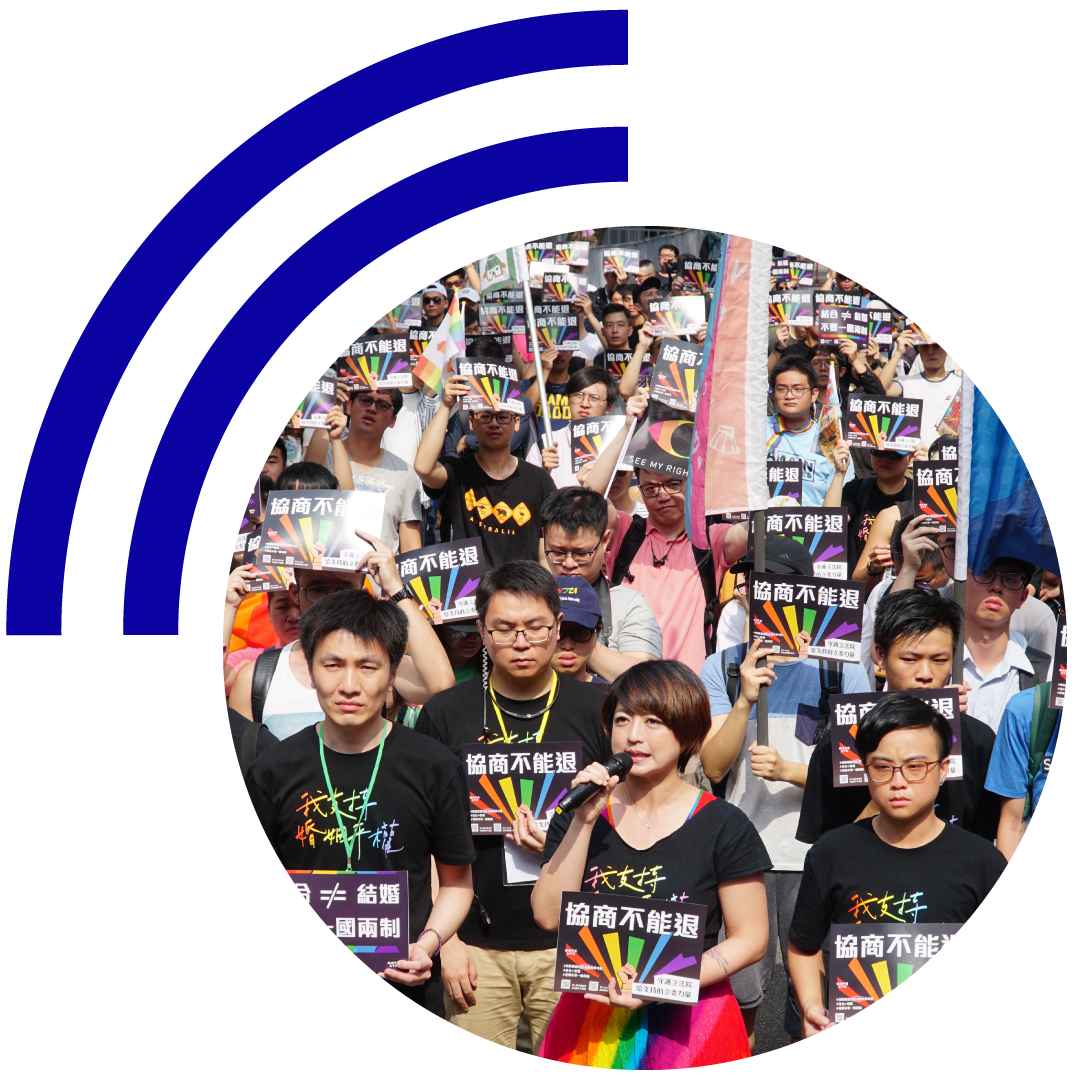
People come from all over Taiwan to Taipei to participate in and witness Pride.
Jennifer Lu | Taiwan
The fight for LGBTIQ human rights in Asia pushes forward through challenges and successes. Learn more from our Director for Asia Programs, Jennifer Lu, based in Taiwan, about the state of LGBTIQ rights in the region.
Jamaica
Despite the hostile climate for sexual and gender minorities, Jamaica LGBTIQ activists and organizations strive to advance the human rights of LGBTIQ people and bravely began celebrating Pride in 2015. The public reception to Pride, in the face of Jamaica’s laws, political history, and religious leanings, is varied.
10 years
Jamaica criminalizes same-sex acts between men under its Offenses Against the Person Act, with punishment of up to 10 years imprisonment. The law has rarely been enforced in recent years.
Facts
- In one case before the Inter-American Commission on Human Rights, the Commission found evidence of discrimination against LGBTQ people in Jamaica and recommended the decriminalization of consensual same-sex acts between adults.
- Since 2015, the National Pride, PrideJa, takes place in Kingston during the week of “Emancipendence,” the period when Jamaicans celebrate Emancipation Day on 1 August and Independence Day on 6 August.
- Montego Bay, on the eastern part of the island, held Pride events from 2015 through 2018.
- In 2019, Montego Bay’s mayor refused to allow Pride participants to use a government agency’s building, the Montego Bay Cultural Center. Other venues followed suit, refusing to rent to organizers for Pride events.

It's always been reported that we’re anti-LGBT. So I think we have to give a lot of credit to the fact that our first Pride was actually held, and subsequently, we’ve had one every year since then.
Malta
Malta has one of the best LGBTIQ human rights records in the world. In 2022, the government worked hand-in-hand with LGBTIQ communities to extend Pride beyond the main island.
2%
By 2019, nearly 2 percent of Malta’s entire population (8,000) attended the Pride March events.
Facts
- Same-sex marriage was legalized in 2017, the year after the enactment of regulations outlawing forms of conversion practices.
- The Maltese Constitution also protects against discrimination based on sexual orientation and gender identity.
- Malta has been at the forefront of legal progress aimed at protecting the rights of transgender and intersex people.
-Malta’s first Pride was held in the capital city, Valletta, in 2004. About 50 participants attended.
- in 2022, the island of Gozo in Malta held its first Pride.

Growing up as part of the LGBT community, you have to find ways to validate your existence... These things – like Pride – make you realize that your existence is valid, you are loved.
Ukraine
Kyiv Pride organizers were in the middle of planning for the 2022 march when Russia launched its full-scale invasion of Ukraine. As the Kyiv Pride organization scrambled to set up a shelter and provide other support to LGBTIQ Ukrainians, the team began thinking of how they would hold Pride during active fighting and martial law. There was never any doubt they would hold the march: the question was how.
Similarly, in Kharkiv, Ukraine’s second-largest city sitting just 20 miles from the Russian border, LGBTIQ activists felt it was essential to hold a Pride event inside the city even though it had endured months of shelling.
30
The [2022] Warsaw march was declared a “March for Peace,” and thousands marched behind a contingent of more than 30 Ukrainian activists representing at least 12 different organizations.
Facts
- In 2012, the Ukrainian parliament was poised to vote on a “gay propaganda” ban modeled on the kind gaining ground in Russia. In response, 15 activists from across Ukraine decided to plan a protest, which became the inspiration for the first Pride.
- As participants assembled in May 2012, they were met by hundreds of far-right counter-protesters. Due to security concerns, the march was canceled.
- In 2022, due to Russia’s full-scale invasion of Ukraine, Kyiv Pride was moved to Warsaw, Poland
- When Pride was organized for the first time in Kharkiv in 2019, the mayor tried to ban it, and right-wing groups attacked the “Pride Hub” by throwing torches and breaking windows
- In 2022, LGBTIQ activists in Kharkiv decided they would hold a march of sorts in the subway, finessing the ban on mass gatherings by calling the event a procession on the way to Pride, even though there was no bigger Pride event they were heading to. 100 people participated.

I believe that it’s forbidden for us not to hold Pride.
Lenny Emson | Ukraine
Lenny Emson is a Ukrainian-born LGBTIQ human rights activist who identifies as a bigender individual. He has over 20 years of experience in the fields of human rights activism and advocacy for LGBTQI freedoms.
Lenny has been involved in the LGBTQI movement as an activist, founder, and employee of several LGBTQ nonprofit organizations in Ukraine and abroad.
Since 2015 Lenny has been a Co-Chair of one of the oldest Ukrainian LGBT organizations, the LGBT Association “LIGA”, and in 2021 Emson became the Executive Director for KyivPride, the biggest pride non-profit in the country.
Intersex Inclusion in Pride
Factors such as invisibility, insecurity, and inadequate funding prevent intersex people and organizations in many countries from achieving adequate representation in LGBTIQ Pride events. There is more to do to ensure equitable representation, visibility, and full inclusion of intersex people in LGBTIQ advocacy and flagship events, including Pride.
2021
Pursuing intersex visibility within LGBTIQ Pride, Valentino Vecchietti incorporated the intersex flag in the Pride Progress flag in 2021.
Facts
- In 2019, Campaign for Change, the first and only intersex-led organization in Nepal, launched its own event with the intent of heightening the visibility of intersex human
- Metro Manila Pride in 2022 was the first time a group of intersex people participated visibly in Pride in the Philippines.
Also, in 2022, 25 intersex individuals participated in the national Pride in Nepal.
- The inclusion of the intersex flag on the rainbow flag is viewed by some as a “big step forward” for intersex people.

It is common for you to forget it, but it shouldn’t be. You should remember the intersex flag as often as you remember the other flags representing LGBTIQ persons.
Trans Pride: the United Kingdom and Australia
As legislatures seek to introduce laws that limit the rights of transgender people, especially in current anti-trans hot spots such as the United Kingdom and Australia, creating safe spaces for visibility, inclusion, and recognition becomes all the more important.

50,000
In 2021, Trans Pride Brighton was an online event with over 50,000 viewers joining
Facts
- Trans Pride Brighton held its first march in 2013 and remains a protest, challenging transphobia in the UK and globally.
- Trans Pride in Melbourne was held for the first time in 2022.

At the main LGBT Pride we [trans community] experienced transphobia from people attending, cisgender and security staff. “if the mainstream Pride does not include us, why don’t we make our own Pride?
Dyke* March Berlin
In countries throughout the world, lesbian, bisexual, and queer women and people who relate to LBQ identities have sought to carve out space for themselves in mainstream Pride marches – often dominated by cis gay men – while also creating their own centers of gravity, one of which, in many cities, is Dyke March.
10,000
From about 2,000 participants in the first year, the march has grown to nearly 10,000 in 2022.
Facts
- Dyke* March Berlin began as an effort for lesbian visibility in Berlin in 2013.
- The asterisk following “dyke” stands for inclusivity.
- In Berlin, the Dyke* March reached its 10th anniversary in 2022.

[A community of] lesbians all over– families, elders, young people who are just coming out. It’s great to see all of those people come together, showing many ways one can exist as a lesbian in Berlin.
Explore More
Pride Around the World Reports
These reports were made possible with support from
